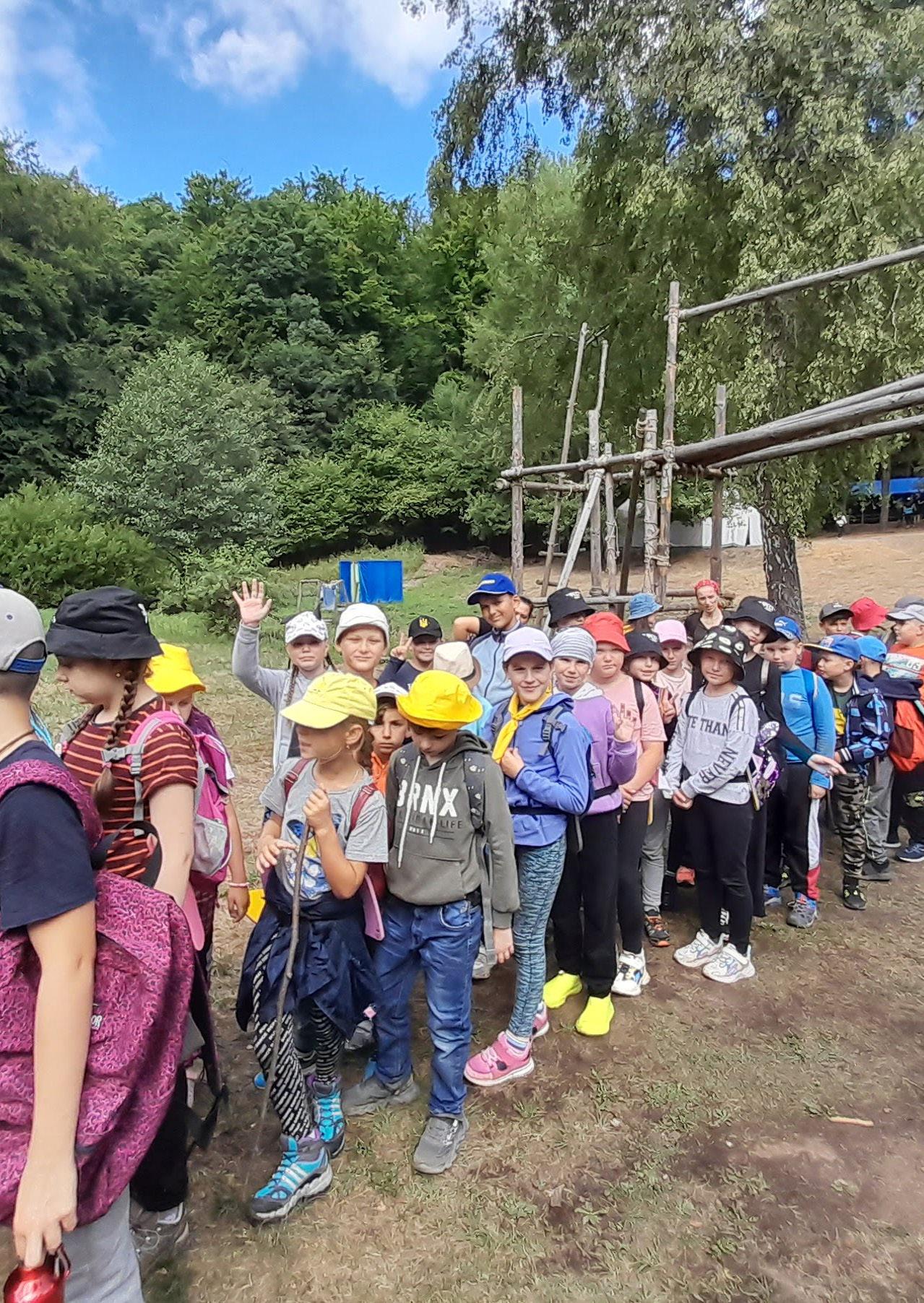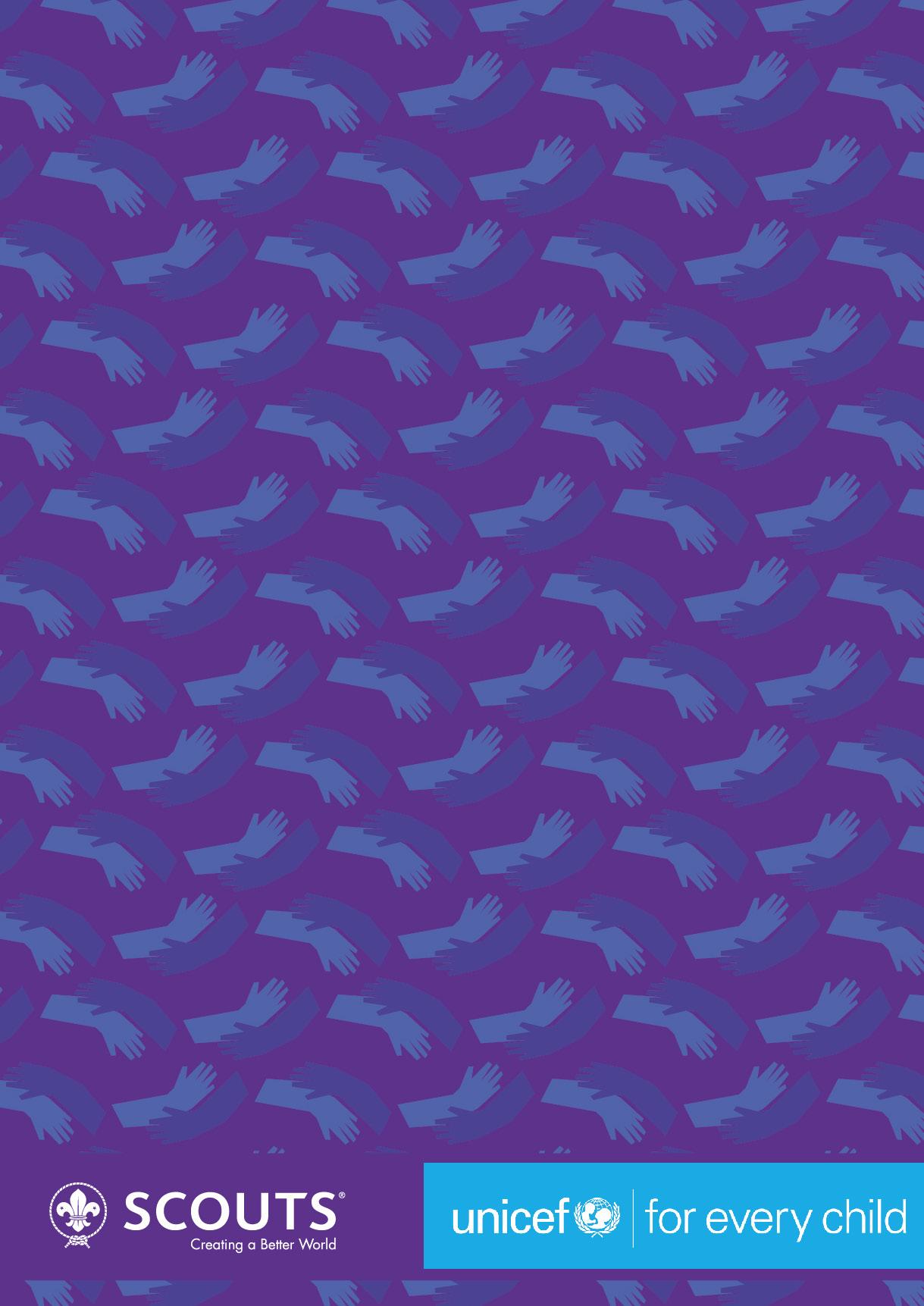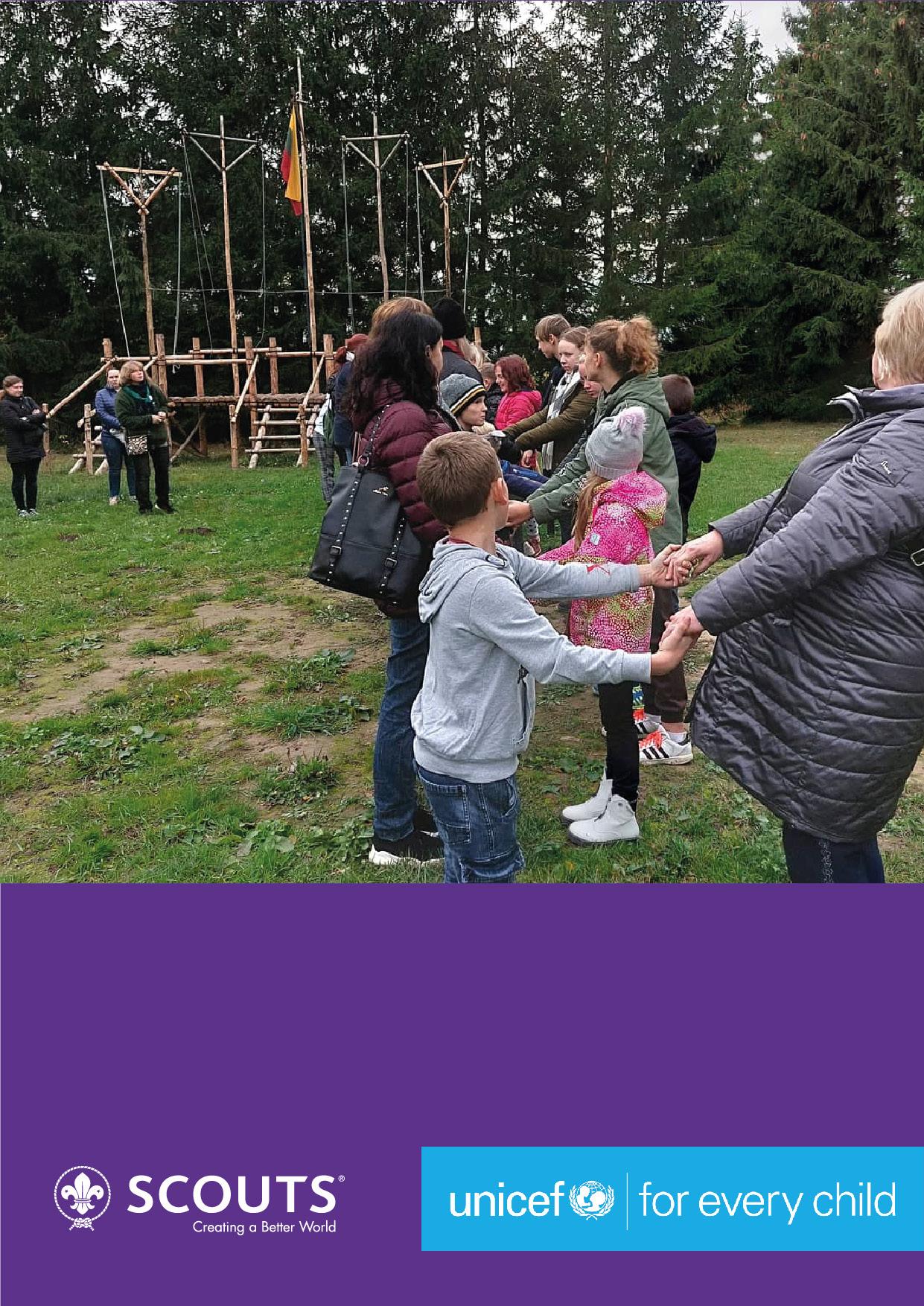
UAct: Scouts in Humanitarian Response for Ukraine Mid-year report
Index
1. Foreword 2. Glossary 3. Scouts’ strategy for Humanitarian Action 4. UAct project’s summary - How our partnership with UNICEF started - UAct: Scouts in humanitarian response for Ukraine - UAct - first steps and evolution 5. Measuring our impact 6. Ensuring Safe From Harm - Integrating Safe from Harm policy and practices into summer camps and daily activities 7. European Scouts Conference 8. Communications and promotions 9. Blue Dots – enhancing existing practise 10. The power and capacity of Scouting Activities; Jamborees & Summer camps - Bringing Humanitarian Action to the Jamborees - Integration and support; Summer Camps & Activities - Poland: Providing psychological support - Czechia: Responding to identified needs - Lithuania: Utilising communications and social media materials - Moldova: Maximising time together - Hungary: Integrating through culture and arts - Slovakia: Safety at the centers - Ukraine: Demonstrating the value of NSOs collaboration 11. Scouting as a mobilizer to deliver Humanitarian Action response - Poland - Ukraine - Czechia - Hungary - Romania - Lithuania - Slovakia - Moldova - Latvia
12. What contexts surrounds the present and future of the UAct project? - The war in Ukraine and its evolution
13. Capacity strengthening, continuous impact and sustainability of UAct - Enhancing competencies for Humanitarian Action - What’s next? The potential for impact

2
Foreword
Dear friends in Scouting,
Since the war in Ukraine started this past February, we saw NSOs and volunteers rush to support an escalating humanitarian crisis. Hundreds of volunteers worked tirelessly to promote peace and cross-country collaboration through their timely humanitarian response.
After formalising our partnership with UNICEF, nine National Scout Organizations have conceptualized, implemented, and monitored a wide range of programmes that support the Ukrainian children and families who were forced to leave their homes. You have driven all your actions by your eagerness to help them feel safe, integrated and heard, for this I am very thankful.
Through your performance, activities, strategies and educational methods you have demonstrated to the entire world that Scouts can be key contributors in any humanitarian response. Your active role in the promotion and stabilization of Humanitarian Action is truly, and very much, appreciated.

It is thanks to direct actions like the development of youth centres, the provision of psychological first aid, the advocacy for human rights, the support to peace education, and the awareness of the importance of building a safe environment, that we can now proudly say that Scouts have reached more than 700,000 Ukrainian individuals for support.
Not only have you brought and welcomed new members into Scouting, but you have also demonstrated the Scout values in every step you’ve taken in this project. You have corroborated the importance of integrity and being trustworthy during difficult times and times of crisis.
Although already six months have passed since launching this project, I am sure that together, we will continue to unify our efforts and persist in showing the world what empathy, determination and courage can accomplish.
Your efforts embody the spirit of what it means to be Scouts and take direct action on the change we all wish to see in the world.
Thank you again for showing such kindness to the people we support; you all make our mission possible.
Yours in Scouting,
Abir Koubaa WOSM-ESR Regional Director
3
Glossary
Adolescent Toolkit -- Adolescent Toolkit for Expression and Innovation
BD -- Blue Dots
BJ -- Baltic Jamboree
CEJ -- Central European Jamboree
ECARO -- UNICEF’s Europe and Central Asia Regional Office
ESC -- Eurasia Support Center
ESC -- European Scout Conference
HA -- Humanitarian Action
IDP-- Internally Displaced People
LCCM -- Michalovce Center in Slovakia
MOVIS -- Management of Volunteers in Scouting
NSO -- National Scout Organisation
PCA -- Programme Cooperation Agreement
PFA -- Psychological First Aid
SFH -- Safe From Harm
UA – Ukrainian
UAct -- UAct: Scouts in humanitarian response for Ukraine project in partnership
UN -- United Nations
UNICEF -- United Nations Children’s Fund
UNICEF RO -- UNICEF Office in Romania
WAGGGS -- World Association of the Girl Guides and Girl Scouts
WOSM -- World Organization of the Scout Movement
ZHP -- Polish Scouting Association
4
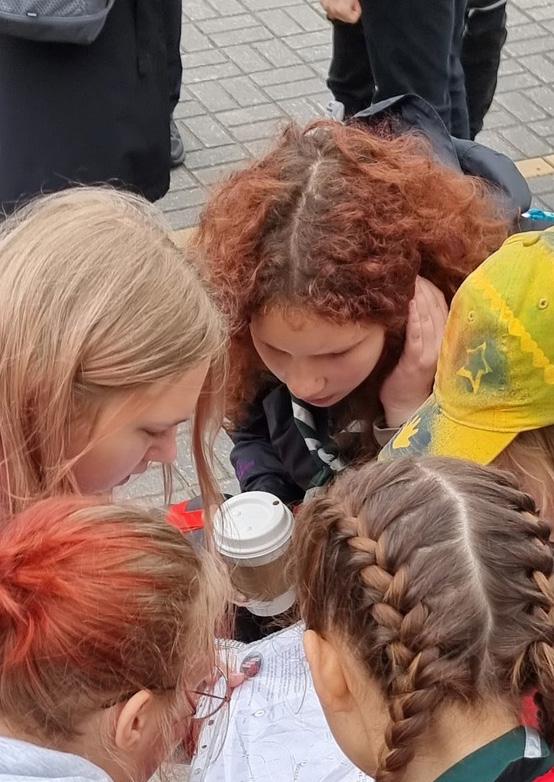
History
The Scout Promise and Law to be of duty and service to others and create a better world, has driven the UAct team members to work together under a remarkable project where young people are the ones supporting crisis-affected children and youth. The UAct project is a representation of the capacity and strength of the Scout Movement and the power of its educational methods that actively contribute to the promotion of peace, dialogue and protection. This humanitarian crisis has allowed the Scout leaders and volunteers to put into action the skills and preparation that Scouting has instilled in them. These essential lifeskills include:
Empathy considered to be the ”moral glue that holds civil society together.“ Scouts demonstrated their capacity to actively listen to and perceive the needs of others and base their support on this.

Working together to provide long-term support that will have a sustainable requires Scouts’ strong determination and willingness to act for change.

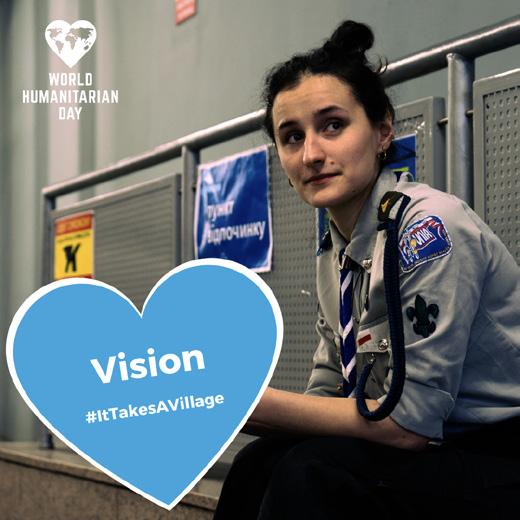
Scouts are visionary leaders who empower one another to achieve their shared goal of service and duty to others. Being involved in Humanitarian action requires constant courage, a characteristic that lies at the heart of being a Scout.
UAct Project’s Summary
How our partnership with UNICEF started
At the start of the conflict in Ukraine, Scout volunteers from the most affected border countries took immediate action to support the influx of Ukrainians arriving and in need of assistance in Poland, Hungary, Romania, Czech Republic, Slovakia, Latvia, Moldova and Lithuania. The response from Scouts on these borders and the support from National Scout Organizations (NSOs) across the regions, took place since the very first days of the war. Subsequently, the role of Regional Crisis Coordinator was established to improve and streamline the provision of support and assistance and to manage internal processes and approaches of collaboration with other European NSOs, Eurasia Support Centre and WAGGGS.
6
At the start of their response, these affected NSOs hosted weekly meetings and developed weekly reports where the number of interventions and refugees reached was reported on per country. This helped identify the needs both among the refugee population and the NSOs to provide an efficient response. According to each country’s identified needs, the Regional Crisis Coordinator conducted an outreach to WOSM and current partners, requesting specific resources including expertise in areas like psychological support and logistics.
During this outreach, UNICEF recognised the Scout Movement for its Programme Cooperation Agreement (PCA) will be held by the European Support Centre of the World Scout Bureau, and will be accountable for deliverables, reporting, finance distribution and programmatic support to the nine partner NSOs, as outlined in the agreement. A key segment of this partnership would rely on the information collected and delivered by NSOs via weekly situation reports that would then be consolidated and shared with UNICEF via a Project Officer.
The target group to reach with support in this partnership is Ukrainian people, including young people aged 10-25, particularly from vulnerable backgrounds, seeking asylum or displaced due to war. The
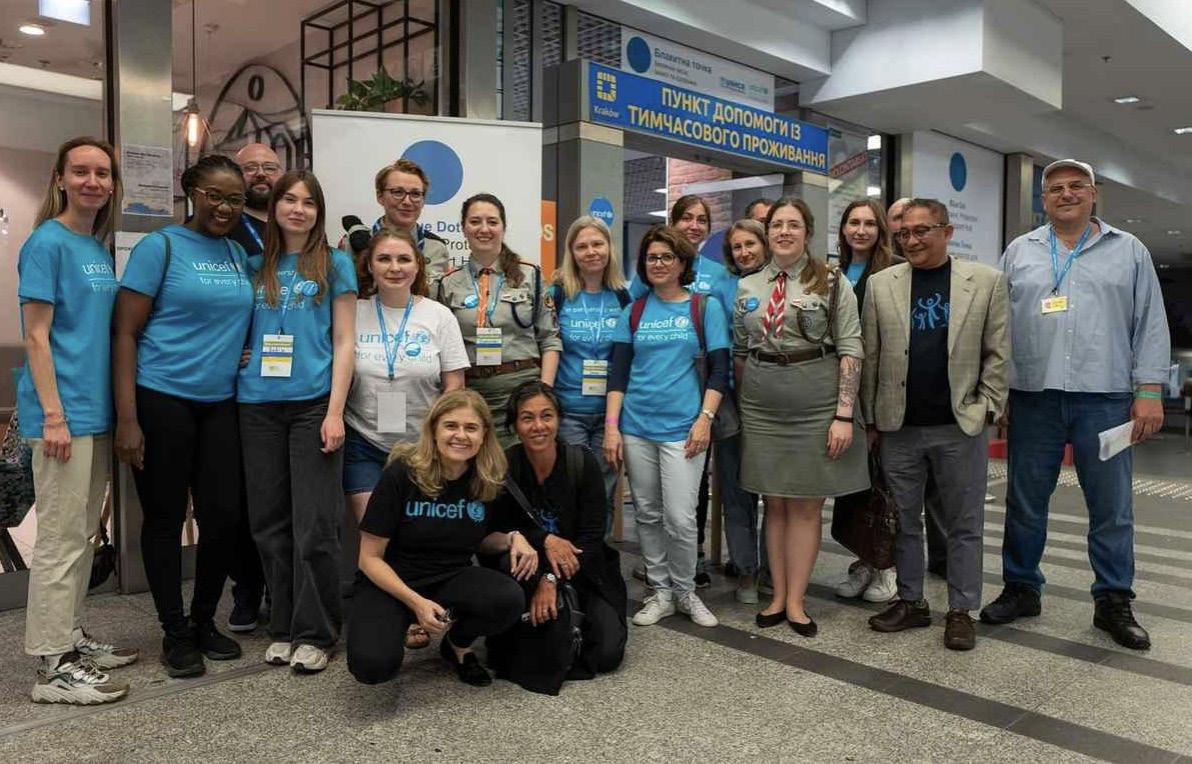
7
target group would be assisted by WOSM through Youth Engagement, communication and practical support provision, competency-building and social cohesion and integration.
Together, WOSM and UNICEF recognised the target to reach in this partnership was Ukrainian people, including young people aged 10-25, particularly from vulnerable backgrounds, seeking asylum or displaced due to war. The target group would be assisted by WOSM through Youth Engagement, communication and practical support provision, competency-building and social cohesion and integration.
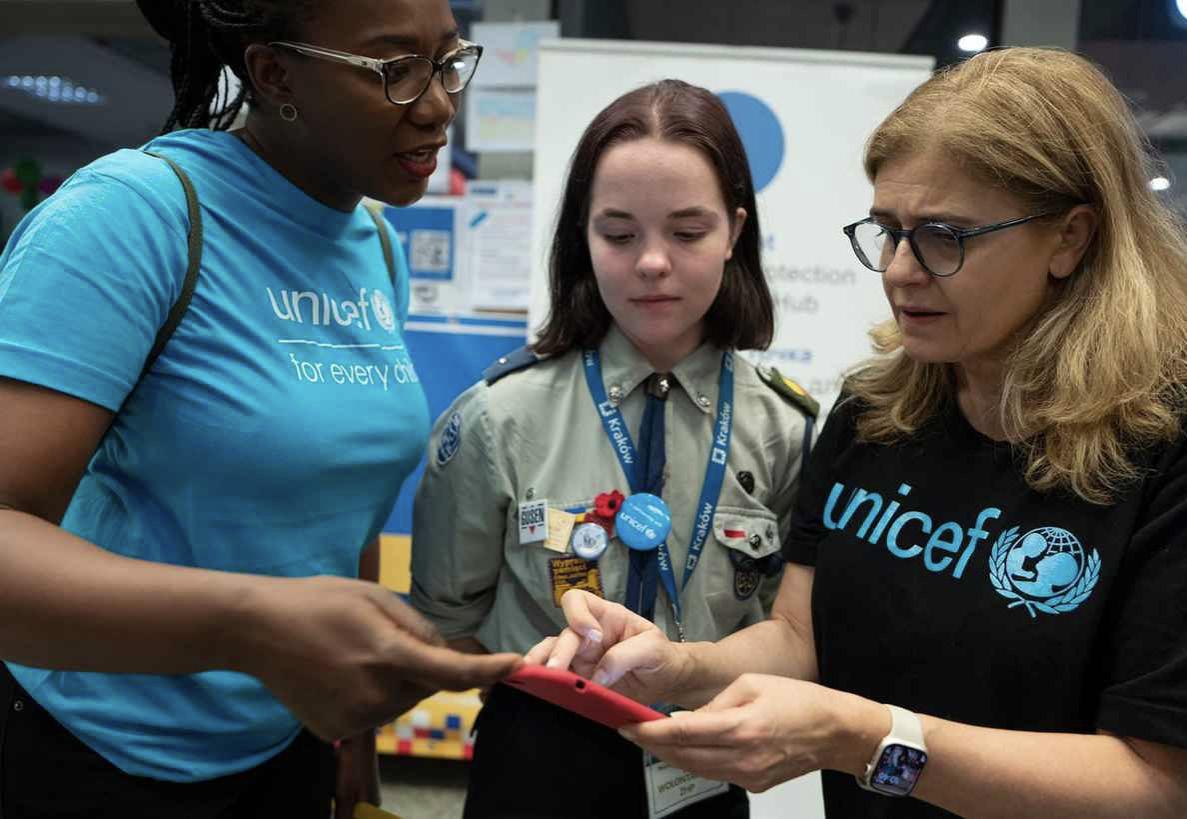
UAct: Scouts in humanitarian response for Ukraine
The goal of the project is to leverage a universal youth engagement platform by mobilizing and orienting Scouts and young volunteers to support UNICEF ECARO cross-sectoral response to the Ukraine refugee crisis through the delivery of frontline support, integration, competencybuilding methods and meaningful participation. This includes supply distribution, referral to Blue Dots and other services, housing, integration efforts and non-formal education.
8
Short-term actions will be classified into:
1. Active engagement of Scouts in the provision of information to women, children and families when they arrive at entry points, relocate, or settle across sectors. They link them to Blue Dots and other services, while also offering other forms of support including essential supplies, transportation or housing.
2. Scouts’ engagement in the promotion of U-Report Europe to strengthen the use of the platform at local level and provide refugees with access to life-protecting and life-saving information, referrals to individualized support (legal, MHPSS, education etc), needs assessment & feedback mechanism and connecting young Ukrainian refugees to each other & host populations for social inclusion.
Long-term perspective of the project is centred around:
3. Establishing Scouts as peer-support volunteers and change agents for adolescent refugees who are especially vulnerable as they face integration in their new communities (schools, neighbourhoods, adolescent groups etc).
The phases of activity implementation outlined in the agreement, are not equally executed in all nine countries, but happen based on the needs according to the local context and the refugees’ situation in each of the response countries.
UAct - first steps and evolution
From 29 April to 2 May, WOSM ESR held the first partner kick-off meeting in Warsaw, Poland, in which representatives from across the nine partner countries participated, joined by the European and Eurasia Scout Region teams.
During the following weeks the NSOs continued their ongoing response and started to prepare the Summer Camps outlining best practices and key aspects to focus on to ensure that “no one is left behind.” This pledge was approached through different methods such as trainings delivered to both Scouts and Ukrainians, direct email communications, newsletters, website updates and social media posts, internal cooperation among different NSOs like Poland, Ukraine, Slovakia and Czechia, and staff recruitment and induction among others.
9
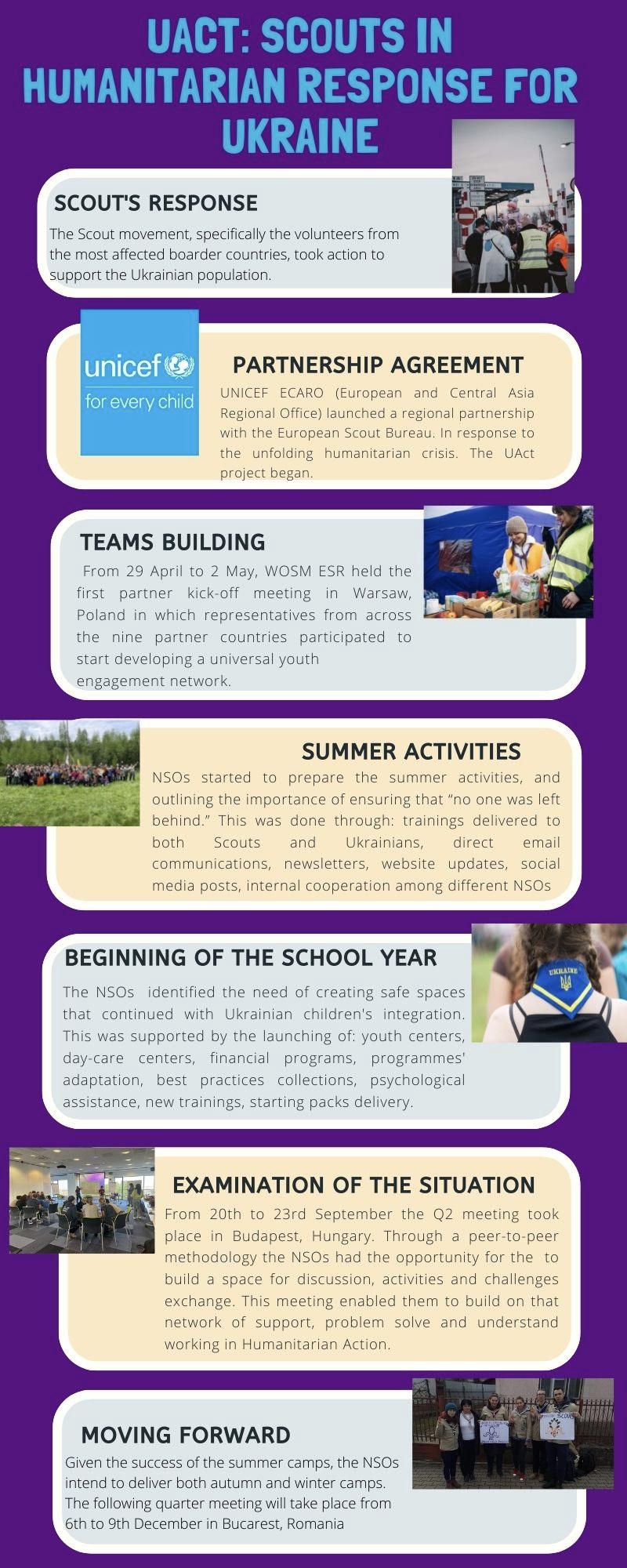
In order to accomplish this, NSOs developed individual project plans, that included short term, medium term and long-term actions. This also included communications strategies such as campaigns, social media promotion, and merchandising; as well as a larger and long termperspective communications plan developed by the European Scout Region, to ensure that Scouts’ achievements and engagement are widely promoted.
Both the European and Eurasia Scout Regions have focused their plans of action in shadowing and helping NSOs to establish independent and structured working teams, along with strategically planning the way forward by responding to the immediate needs of refugees and maintaining a long-term analysis of the situation.
The Europe Scout Region has integrated a more individualized assistance process for the NSOs through regular 1:1’s and by monitoring through the WOSM Services. NSOs have the possibility to access direct support, requesting guidance that is specific to their partnership, programme and project management needs.
The Quarter 2 meeting facilitated the opportunity for the different NSOs to build a space for discussion, activities and challenges exchange, which has been demonstrated to be very useful. This peer-to-peer learning methodology is one of the trusted approaches in Scouting and it has been demonstrated to be of great value for the NSO Focal Points taking part, as it enabled them to build on that network of support, problem solve and understand working in Humanitarian Action.
This session led to the examination of the situation of each NSO individually, it was an opportunity for the focal points to present some of the main achievements reached per NSO as well as hold each other to account for level of engagement and contribution surrounding individual disaggregated data. This approach strengthened the space for the NSOs to, in small groups, discuss over the aspects of the project they were finding more challenging or were there was a a sense of uncertainty.
These conversations were always held under the concept of finding solutions, especially when discussing difficult situations or main concerns. Together they shared their programmes and actions, exploring the different approaches they had had towards these. Overall, the meeting recalibrated the all stakeholders in the project phases and timeline for such deliverables.
11
Present
To build on the promotion of the partnership and position Scouts among first responders in humanitarian settings, the European Scout Region has been constantly identifying key media opportunities and campaigns, leveraging on global days such as International Humanitarian Day or the World Youth Day to publish and extend the achievements accomplished by the countries that participate in this project.
LLastly, concluding UAct the country NSOs, supported by the European and Eurasia Scout Regions, will have created strong national partnerships with National UNICEF Country offices and facilitate the ongoing collaboration to respond to humanitarian crisis. Already, Poland, Romania, Moldova, Hungary and Czechia are finding way to collaborate and increase the impact on a national level.
Measuring our impact
As access to accurate data is one of the key focus points of this partnership, the European Scout Region developed a completely new and automated process, to collect data directly from the border countries, and transform it into accumulative figures presented to UNICEF through the weekly Situation Report.
The collection of this data, as well as the guidelines and materials collected along the project will be part of a “Best practices and procedures” package that is being developed along the entire duration of the project, where disaggregated data is stored, along with shared processes, lessons learnt and any other relevant piece of work that will be useful for any NSO facing a humanitarian emergency in the future.
Disclaimer: Accuracy of the Information: We attempt to assure that the information offered in this report is complete and accurate; however, this information might appear outdated over time as newer data is provisioned from the country offices where this project is being implemented. This is due to the possibility the NSOs have to report on previous reporting weeks.
12
Ensuring Safe From Harm
A relevant deliverable of this project is to provide all nine NSOs with Humanitarian Action response skills and competencies. One of the longterm objectives of this project is to create a network of proficient and experienced humanitarian actors that have been able to use Scouting abilities and educational materials to own a significant role in crisis response management.
To accomplish this, NSO team members prioritised Safe from Harm as an essential in any engagement, particularly in a crisis context, to ensure that every person involved in Scouting is responsible and committed to protect children and young people inside and outside the Movement, and make the safety of young people their utmost priority.
UNICEF’s Child Safeguarding Team and the UAct project team worked together and share their expertise and strengthen the Scouts’ approach to holistic safeguarding and Safe from Harm during the summer events, for young people and adults alike, for all partner NSOs.
In response to that, and demonstrating an extraordinary example of how this kind partnerships is enriching the different organizations that compose them, an e-learning, was developed with the expertise of Scouts involved in this project, WOSM Consultants and other Humanitarian Action actors in the Region. The Safe from Harm e-learning piece aims to better familiarize Scouts involved in Humanitarian Action with important knowledge required when responding to crises, while also staying safe from harm. This e-learning’s materials have been developed as a prerequisite for Scout leaders and others offering humanitarian assistance to vulnerable populations, in order to proceed with humanitarian action.
Integrating Safe from Harm policy and practices into summer camps and daily activities
To ensure the consistent implementation of Safe From Harm across summer camps and activities, support was offered to each NSO in relation to code of conduct, adult training, reporting procedures and model Listening Ear system. Accelerating work in these areas invests equally in the future Safe From Harm procedure and policy for each NSO, in their adult training, programme and implementation of WOSM constitution.
Based on the actions taken by each NSO to assure a safe delivery and approach to their programmes and monthly actions, this table has summarised the different areas to focus on from a Safe from Harm perspective.
13
Physical Safety
Psychological Safety
Preventions
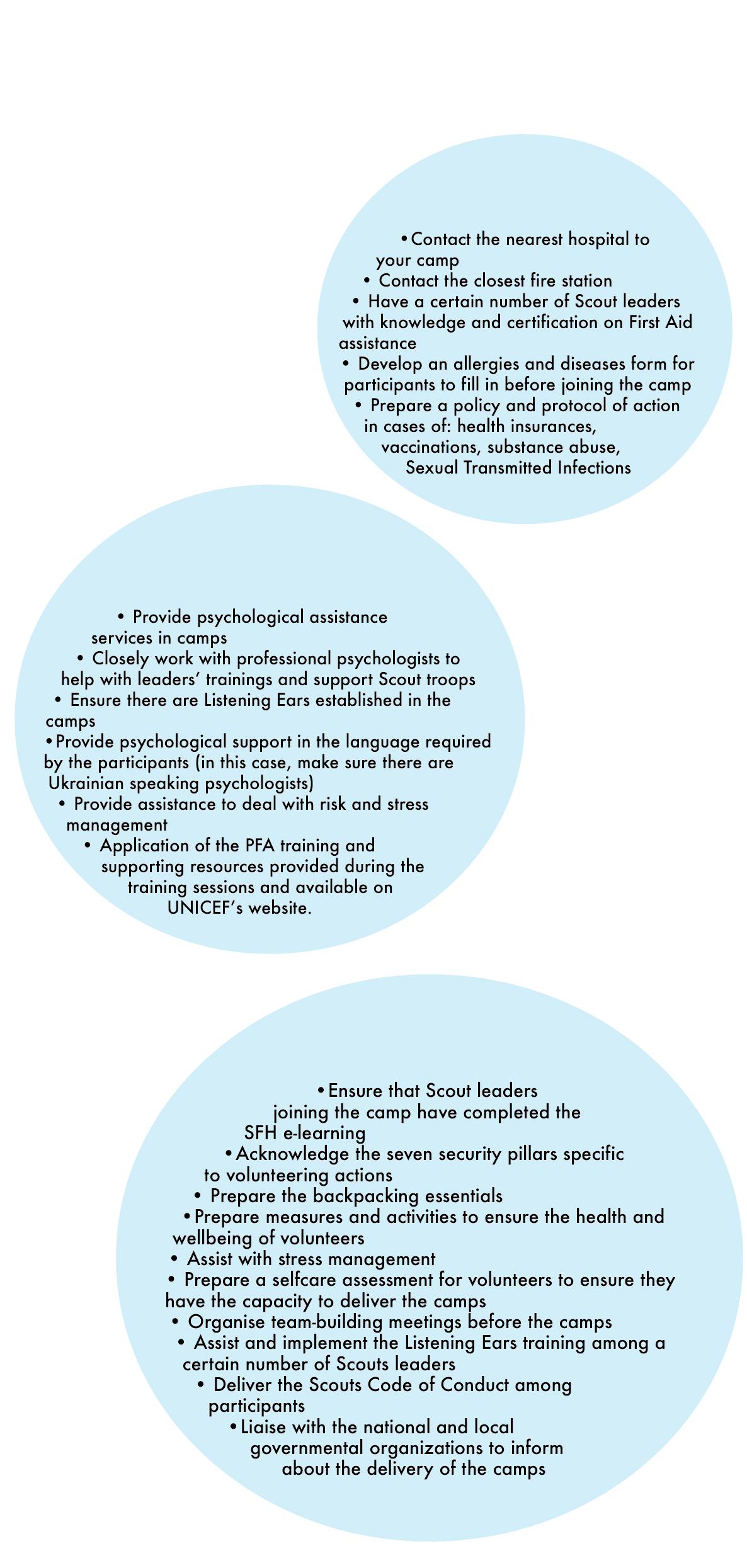
14
A crucial component to ensuring a safe environment during Scout programmes and activities responding to a humanitarian crisis is the Psychological First Aid (PFA) training. The training was delivered online in April 2022, attended by at least one representative from each NSO and guided by experts PFA from UNICEF. The training’s main objective is to build skills on how to best support the psychological wellbeing of children and families affected by conflict and traumatic crises, understanding the needs of affected communities in order to aid their coping skills and resilience. NSOs have now built these skills into the volunteer and adult training, to empower them to act as support for the children’s mental health and wellbeing, to alleviate their suffering, restore their confidence and foster positive coping mechanisms.
Complementary to the training, the NSOs were given supporting material developed by WOSM and UNICEF about psychological wellbeing, war trauma, how to speak to children about war and how to deal with stress. Some of these additional resources on mental health and psychosocial support are below:
15
The MHPSS Minimum Service Package (MSP) PFA Handout How to support your child during conflict and crisis situations MHPSS toolkit for the Ukraine response 5 tips for dealing with uncertainty in times of war Doing What Matters in Times of Stress MHPSS 1- pager How to talk to your children about conflict and war UNICEF - Caring for the Caregivers Package
UNICEF MHPPSS field guide
The 24th European Scout Conference

During the European Regional Scout Conference that took place in Rotterdam on the 24th of July, guests from the UAct project and Eurasia Scout Region, joined NSOs from across the European Region in their discussion, including the next Regional Scout Plan, looking back at the previous three years and forward to the the new triennium.
During one breakout session the project was presented to Conference delegates by members of the UAct project from Poland, Latvia and Romania. They explained their approach, the short-term actions, the long-term plans for the programme, training and preparedness, as well as the challenges and impact of the project to date.
Due to unwavering commitment and lighthouse example of Scouts meaningfully engaging in Humanitarian action in the UAct countries and the continuously changing developments in Ukraine and neighbouring countries, an emergency resolution was presented to the Conference, outlining the European Scout Region’s response to this crisis and beyond.
16
The Conference reaffirmed that peace education has always been a constant concern for the Scout Movement, and should be strengthened as a key objective for bringing millions of children and young people together in fellowship to help one other.
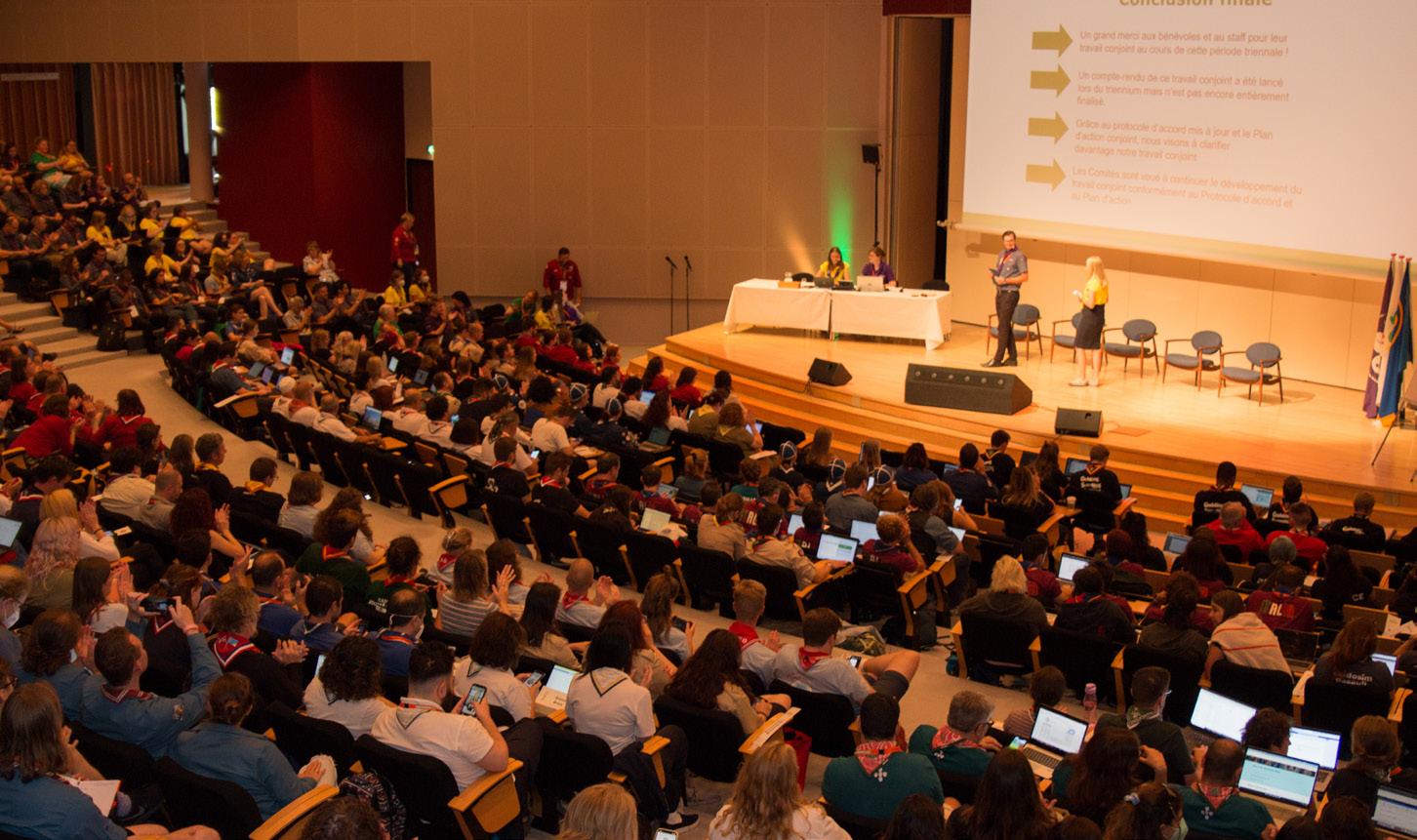
The adopted Conference’s Resolution recognises the impactful work done by the Member Organizations in the continuous response to the war Ukraine and strengthened the importance of the European Scout Regions role in supporting partnership, resource mobilisation, learning and non-formal education for young people in promoting peace and dialogue.
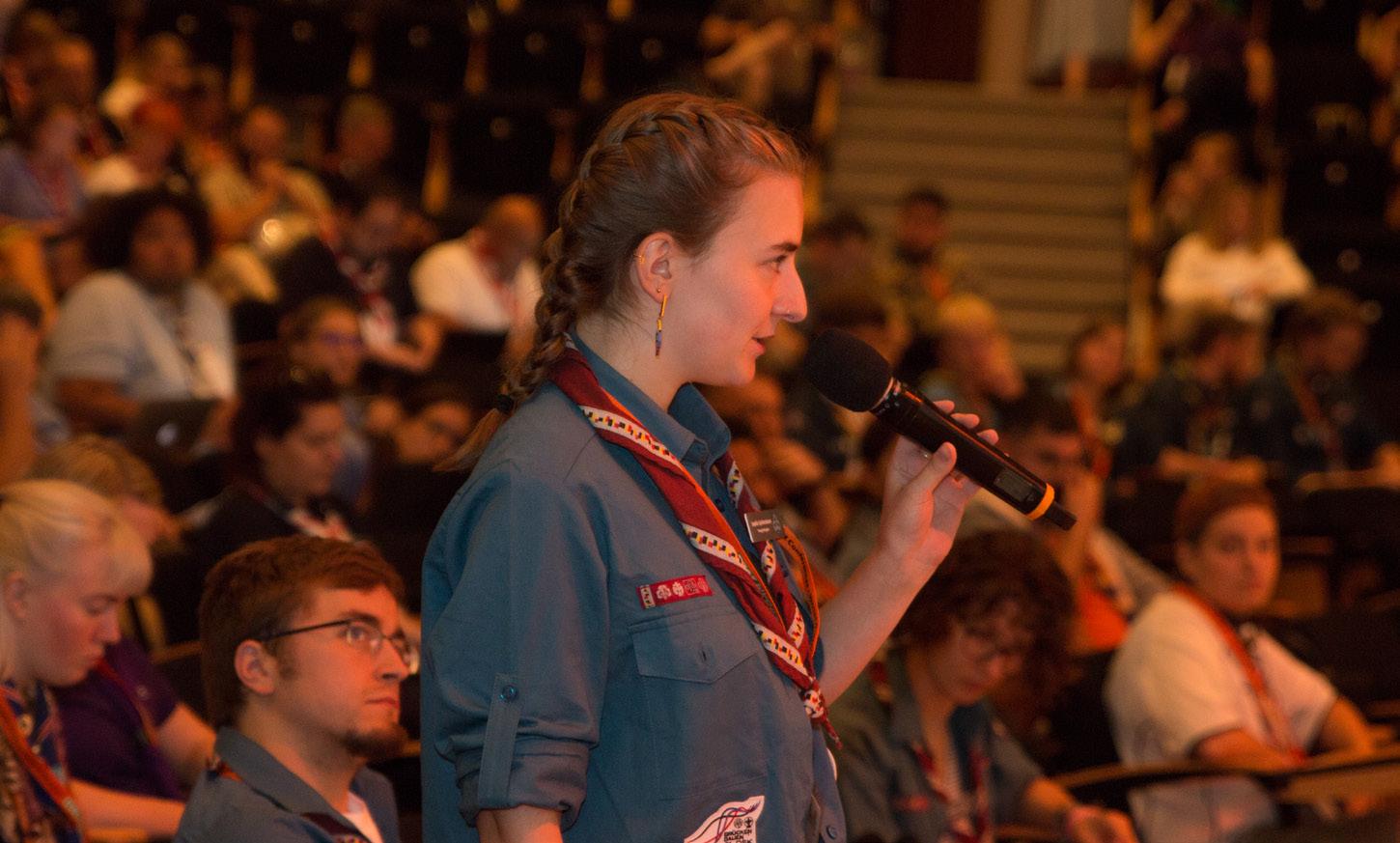
17
Communications and promotion
Communications is an integral part of any humanitarian response project. It drives visibility, credibility and aids in advocacy and fundraising.
Once the UAct project was launched, the European Scout Region developed a Communications Plan that comprised of communication objectives, key messaging, target audiences, content types, editorial calendar, storytelling opportunities and an implementation plan. The plan is a roadmap that guides the communication efforts for the entire duration of the project, while building the capacity of NSOs to continue with the communications practices.
The ESR has been working closely with UNICEF’s communication focal point for UAct, and together they have conducted two communication trainings for NSOs. Together, they delivered an online training to NSOs on Communications in Humanitarian Action, focused on UAct, training on content gathering, photography and branding guidelines, and understand how to best communicate their successes.
To support the effective implementation of the Communications Plan, the European Scout Region created a shared Trello board to allow NSOs to access photos, logos, guidelines and campaign information. The Region also created a direct channel with NSO communication focal points to promote the engagement of NSOs and their content gathering.
A key communications outcome of the project is the Scouts Diary, a digital publication featuring stories of Scouts from the nine countries involved in UAct, to put a voice to this youth-led humanitarian response. Overall, communicating about the partnership and giving recognition to a donor is integral when communicating about a project.
Blue Dots – enhancing existing practise
The Blue Dots are a UNICEF intervention that offer safe spaces, immediate support and free of charge services to all persons, of all nationalities, in this case, those fleeing from Ukraine.
18
They have been set up in locations where Ukrainian refugees arrive, when border crossings and along anticipated routes of major refugee flows. They have been launched either in strategic urban areas or transport hubs like bus or train stations, as well as in refugee registration sites, reception facilities, or cash distribution points.
Each Blue Dot includes a series of professionals constantly available to reach for support. This can include: a social worker, mental health worker, legal aid expert and interpreters.
The assistance and support provided by the Scouts at the UNICEF Blue Dots covers:
- Psychological support to Ukrainian children, adults, and young people.
- Support and assistance provided to social workers.
- Special care for unaccompanied children.
- Kindergarten space where Ukrainian children can stay and be taken care of when parents or family members need to tend to other priorities.
- Legal advice.
- A station with necessary services for people with both physical and mental disabilities.
- Non-financial aid provision: including food, cosmetics, clothes, health requirements
- General information provision.
- Assistance to Ukrainian refugees who need local administration services such as filling out documents, applying for social security numbers etc.
In Poland the NSO has fiercely demonstrated the capacity and organization of the Scout volunteer team by collaborating with UNICEF and now, responsible for running the different Blue Dots located along the country.
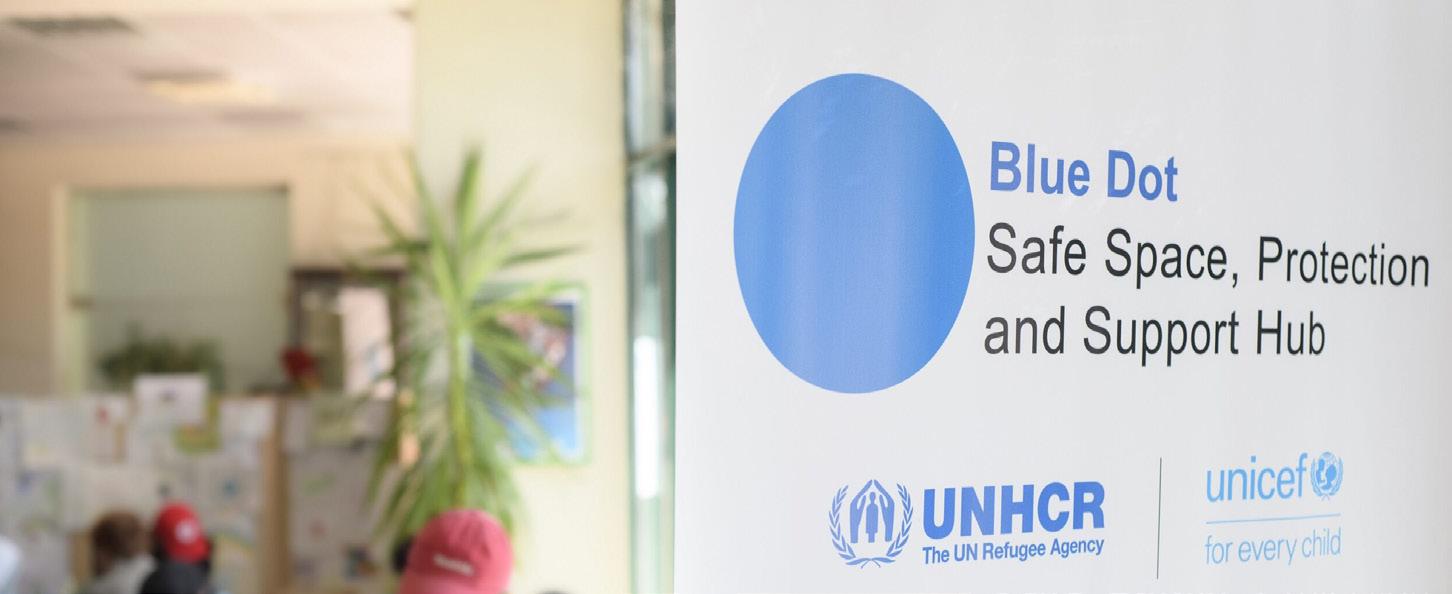
19
At the moment, there are five Blue Dot run by ZHP, in locations established in the country:
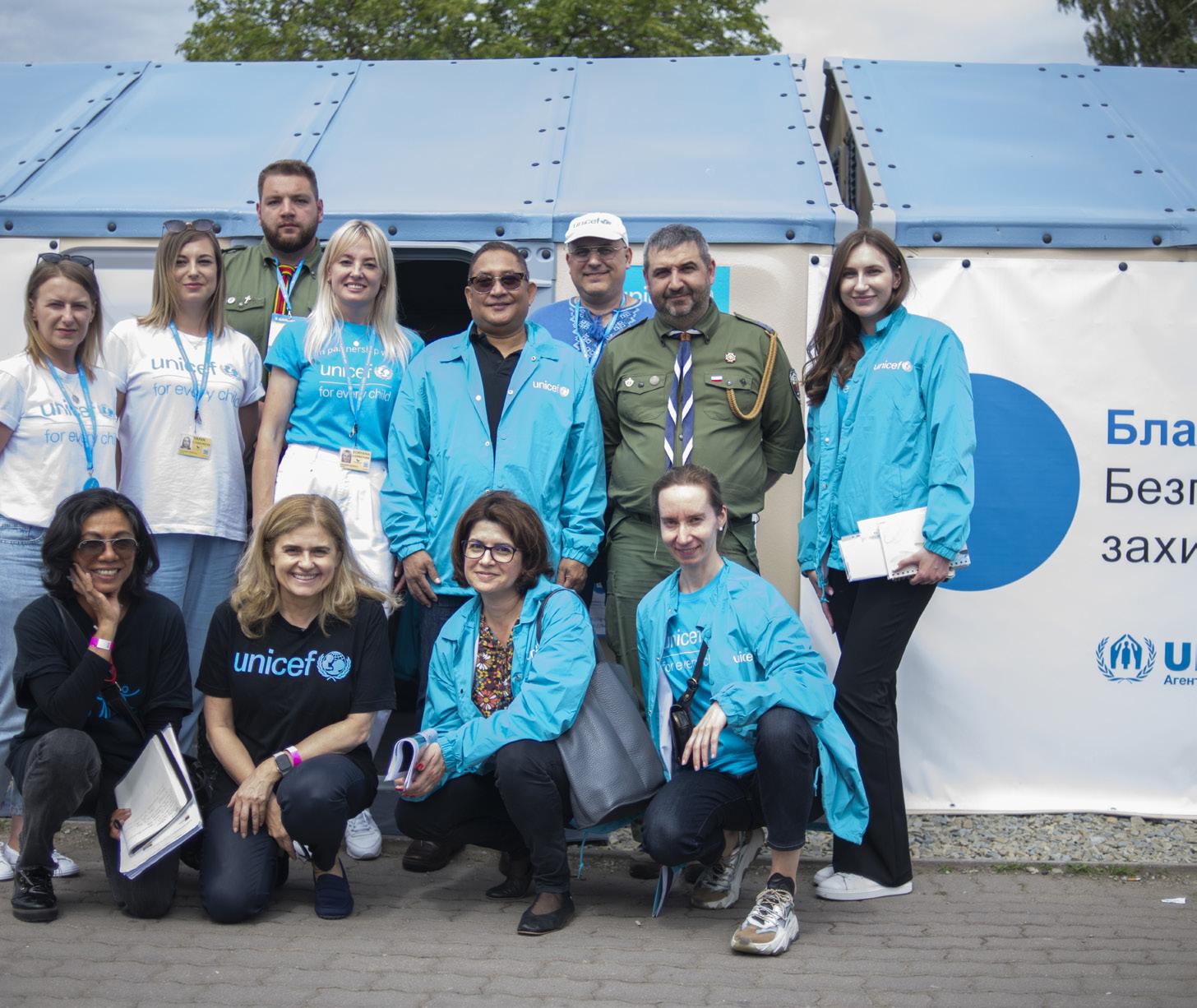
1 Blue Dot spot in Medyka
1 Blue Dot spot in Przemysl
2 Blue Dot spots in Krakow
1 Blue Dot sport in Warsaw
Scouts have shown to have a specific mindset of skills that can be used to solve problems. These capacities allow the Scout volunteers working at the Blue Dots to break emerging problems into smaller steps that need to be followed when figuring out what is needed and how to reach a solution. It has been Scout’s profound desire to make the world a better place, that has motivated the Polish NSO team members and volunteers to overcome the many challenges and difficulties Blue Dots can entail, and continue with the delivery of an action that is one of the largest actions this project supports, and provides almost a 70% of the numbers of Ukrainian individuals reached for support each week.
20

Jamborees & Summer camps
The power and capacity of Scouting activities
Scout’s expertise has been reflected during the summer camps where the programmes delivered have strongly demonstrated how Scouting activities not only provide with life-lasting skills, but also promotes emotional and personal development.
Scouting develops in its members a mentality that pushes them to look for opportunities to help and be useful, occasions to grow and learn more. This year’s summer camps and activities have proofed this through the large variety of activities and programmes that the NSOs have built during the summer.
Not only have the nine NSO members evidenced their capacity to integrate new members into the troops, but they have also made clear that Scouting non-formal education methods allow transversality and can benefit from multicultural environments.
In situations where many unexpected challenges could come front, from language barriers, to border security, mental breakdowns or cultural differences, Scouts have made the most of each opportunity, delivering happy, favorable and enriching summer activities.
“Scouts are excited about the opportunity to contribute to helping Ukrainians and the children show mutual respect”. - Quoted from Lithuanian Scouts webpage. Link, here.
22
The variety of camps (day camps, weekend camps, 7-days+ camps, etc.) allowed NSOs to cater to the interests and availability of all young people, making it inclusive for all young people.
The summer camps’ educational programme was designed to meet the needs of children and adolescents in each country and support the inclusion and integration of the Ukrainian children joining them.
Some camps of the activities offered included:
Bringing Humanitarian Action to the Jamborees
The Baltic Jamboree and the Central European Jamboree have been firm representatives of the collaboration between NSOs and team members’ integration.
One of the sessions facilitated during the Jamborees intended to bring Scout volunteers and members closer to the meaning of Humanitarian Action, and how it is something that can completely relate with the Scout movement and Scout learning mechanisms.
23
By posing questions like: “What activities do you think can be considered as part of humanitarian action?” Or “How can Scouts engage in humanitarian action?” Young people were actively engaged in a creative programme that encouraged personal reflections on how to be mindful with language, trauma or sensitivities when providing support in Humanitarian Action
One of the programmes delivered to raise awareness of the importance of young people’s involvement in humanitarian action, was oriented in a way in which an initial casual conversation on the UAct project’s activities and results, genuinely led to the participants sharing of stories and experiences lived, successes and challenges.
Making use of the activities proposed in the Adolescent Toolkit, the session’s facilitator incited the participants to finish the sentences “I am, I have, I can” to help them reflect how each of the individuals taking part on the session collaborated to enrich the Scout’s movement in diversity, backgrounds and skills.
This consciousness session opened the space for the different Scout team members participating to share their personal life experiences when dealing with crisis management, and build together some best practices that could be used or implemented in the project’s future actions.
Some of the questions that were used to guide this conversation were:
- What age were you when you first experienced or witnessed an act of discrimination?
- Think about your community, what challenges do people face?
- How does your local scout group engage in the community?
- What do you, as a member of the community and young adult consider an urgent need in your community?
- What support or what else do you need to start or continue taking action?
These questions meant to create a sharing space where not only Ukrainian children were able to partake the session and communicate with their Scout friends the life-changing situation that they were experiencing, but it also helped Scout leaders to better understand the requirements or threats from Ukrainian children.
24
Integration and support: Summer Camps & Activities
Below are some examples of how Polish, Czechian, Lithuanian, Slovakian and Moldavian NSOs have organised and delivered their summer camps, each on their own way and focusing on the areas that were most needed from the children participating in them. All of these camps have contributed to an extraordinary movement of young people putting on each other’s shoes and opening their minds to think beyond the borders, experiment new engaging opportunities, and, together grow in diversity.
Poland: Providing psychological support
The NSO continued its support to Ukrainian children through more than 400 Summer Camps and activities planned along the summer holidays, starting on 4 July. A total of 6,260 Ukrainians were able to join the camps and activities.
Psychological support has been a key aspect of Poland’s camps, there
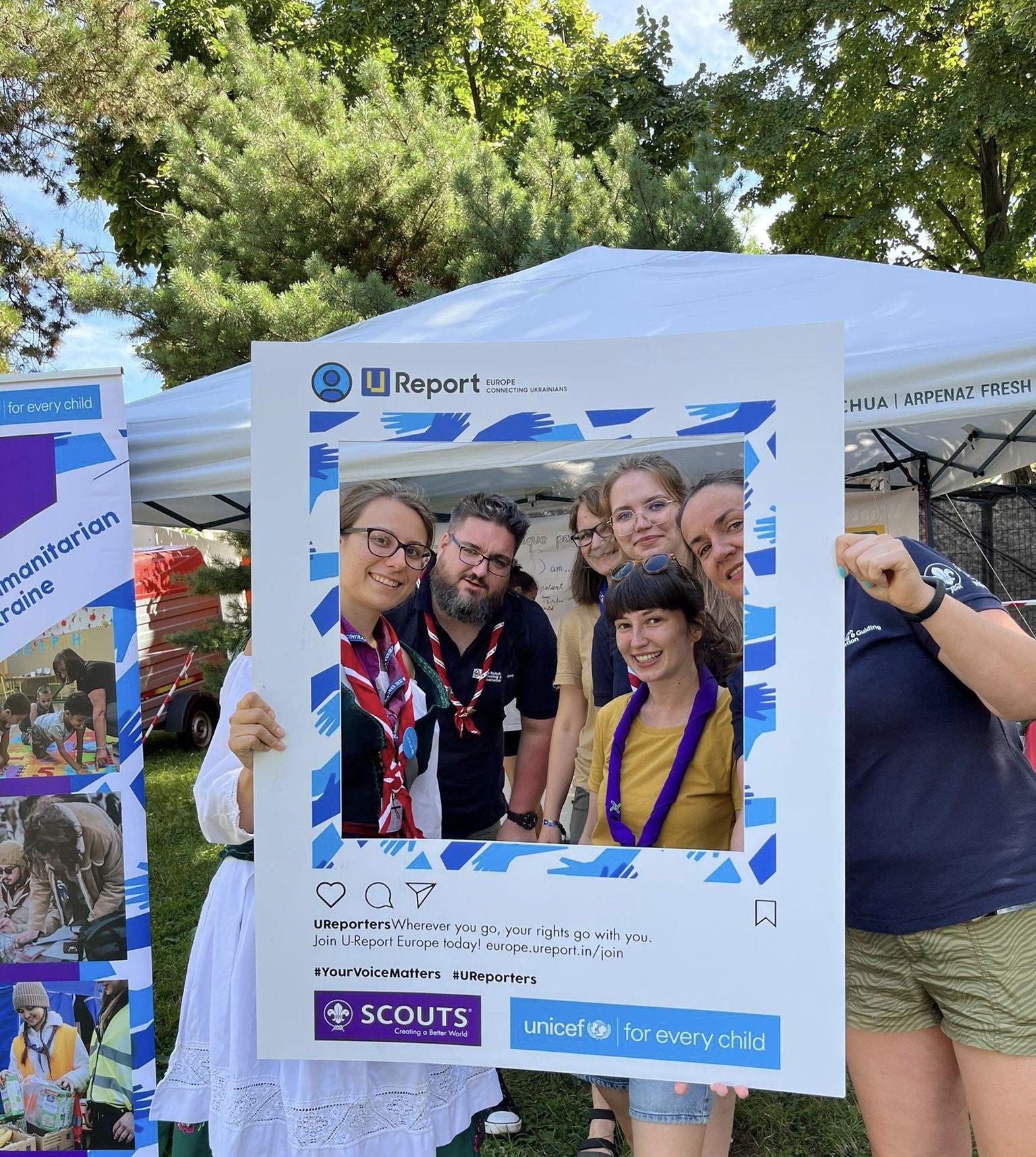
Czechia: Responding to identified needs
In regard to the summer and day camps, the Scouts groups that have participated so far in a total of 70 summer camps that welcomed 552 Ukrainian children. Czech Scouts also welcomed 48 Ukrainians Scouts participants, and 5 Ukrainian Scout leaders at the Central European Jamboree, supporting them with all necessary equipment and guidance.
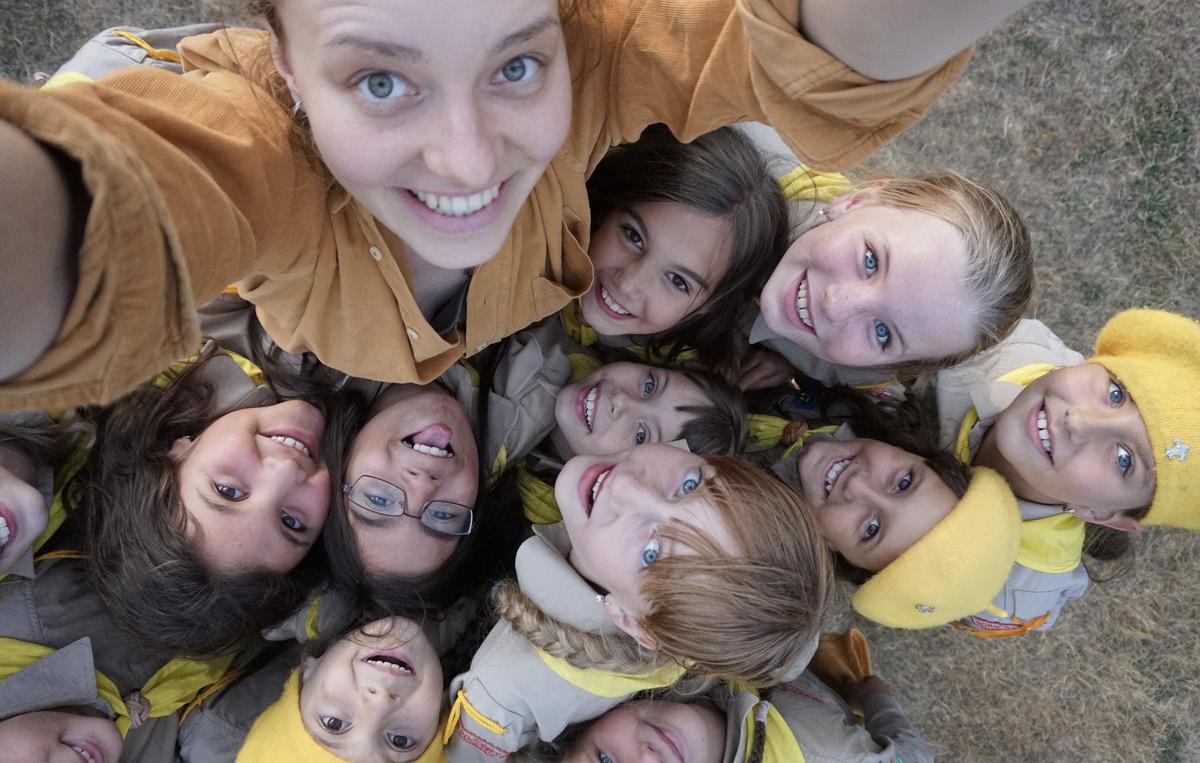
Czech Scouts worked closely with Ukrainian adults and youngsters to assure that the camps responded to the needs of the Ukrainian population. The local authorities provided Czech Scouts with a space in the centre of Prague, where not only Scouts delivered different educational programmes, but also it served as a place where Ukrainian refugees could ask for support or simply spend time together, staying connected as a community.

26
This map shows the different locations where Czechia Scouts have delivered their different summer camps and activities, colour coded as follows:
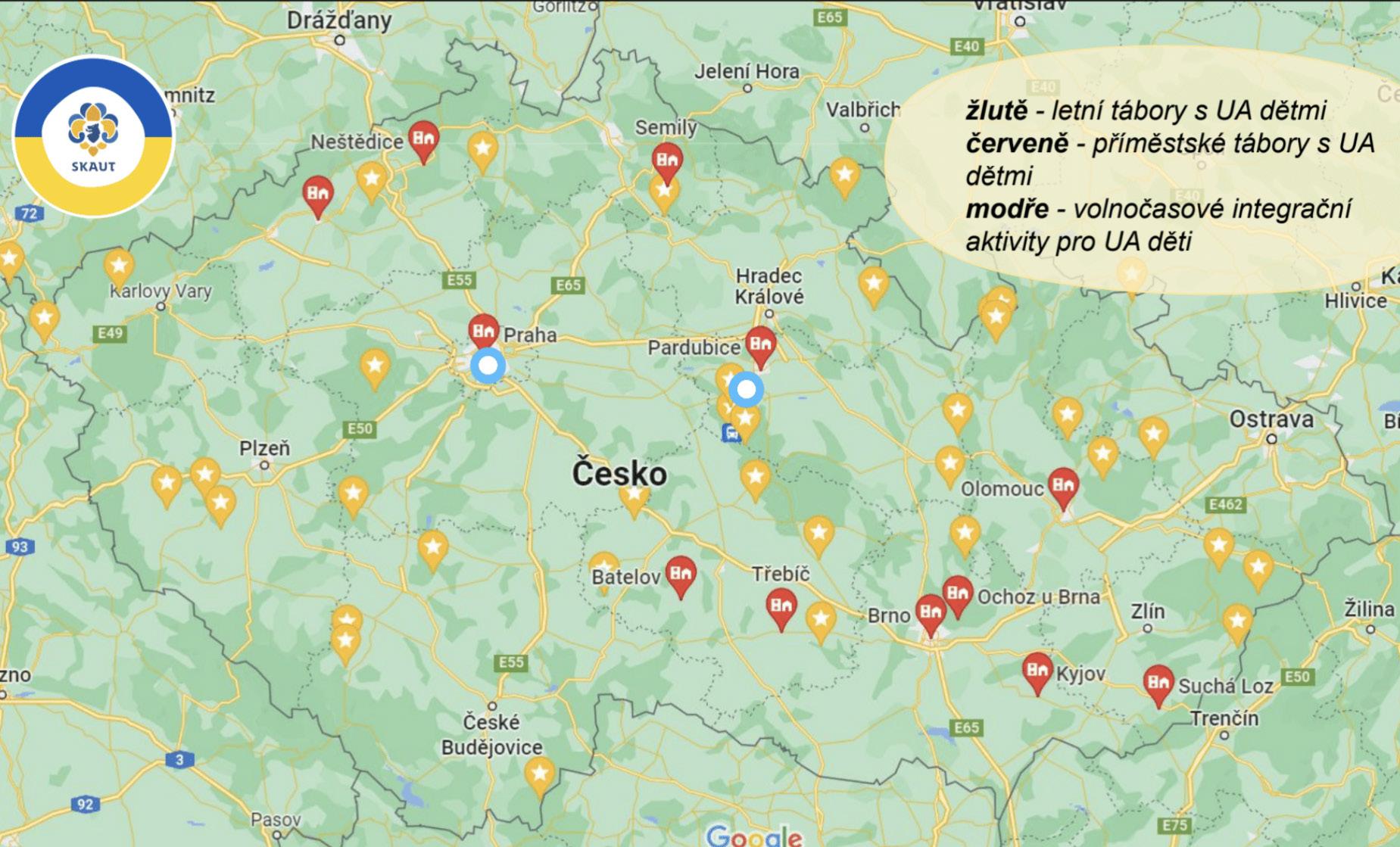
- Yellow: Summer camps with participation of Ukrainian children
- Red: Suburban summer camps welcoming Ukrainian children
- Blue: Free time integration of Ukrainian children into daily activities
27
Lithuania: Utilising social media and communication materials
Prior to the start of summer, the Lithuania NSO actively prepared its NSO team members and engaged with the Ukrainian community by:
• Leading several training sessions for its Scout leaders and volunteers on how to adapt their programmes to cater to Ukrainian children and adolescents, with a focus on Psychological First Aid.
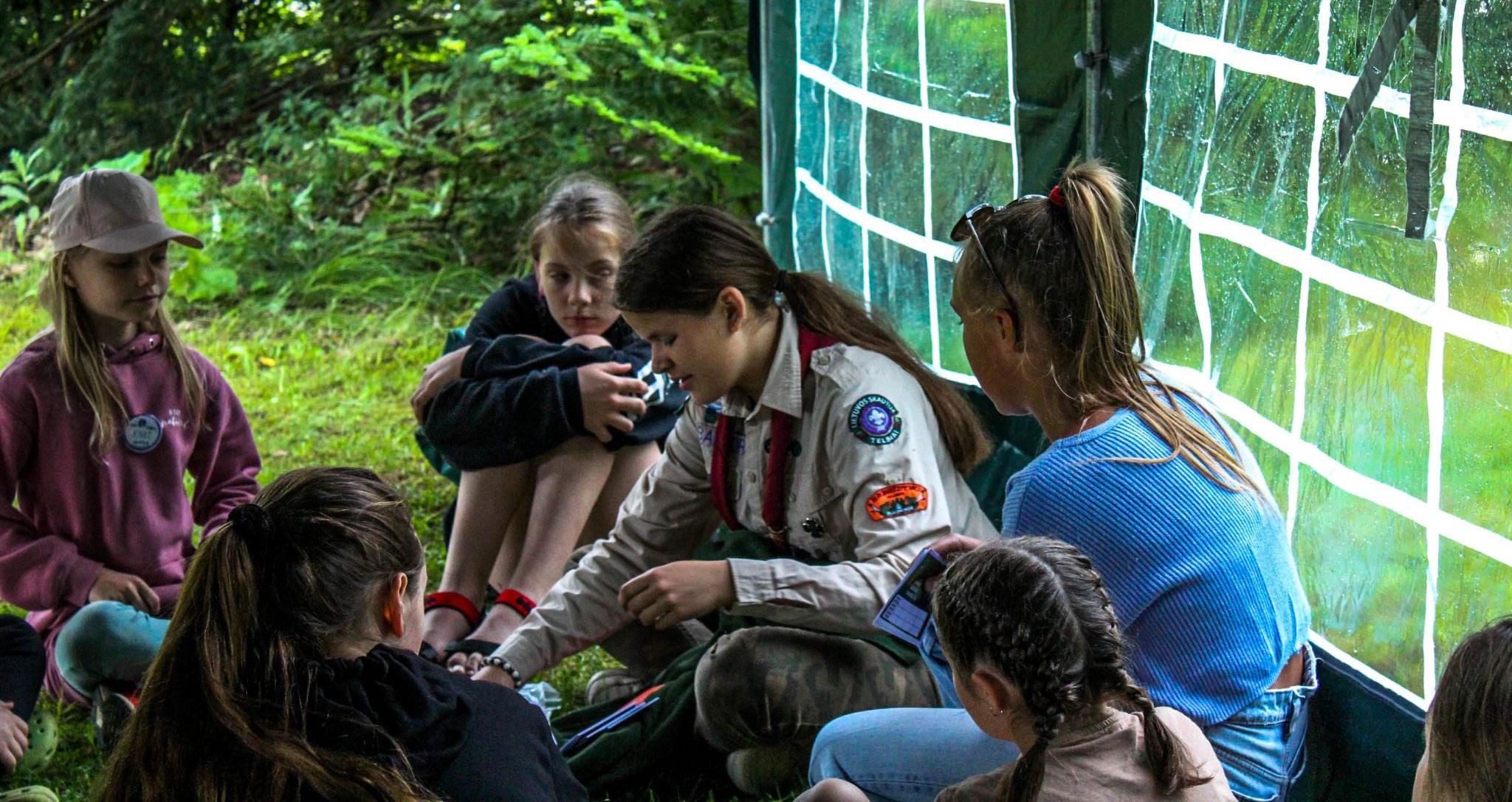
• Launching the website for Summer Camps
• Developed glossaries of basic sentences in Ukrainian and Lithuanian
• Used their social media platforms to promote its activities with Ukrainian children and youth, and encouraged them to join the camps
• The Chief of Lithuanian Scouts met with the Ukrainian Ambassador to Lithuania and extended an invitation for him to visit the Scout Centre and the Ukrainian children benefiting from the programmes and activities offered
• Delivering a total of 239 communication letters to inform Ukrainian parents about the summer and day camps possibilities, important information and aspects to take into account to assure a safe and successful experience for Ukrainian children
• Actively using of the Facebook page here, or the official Ukrainian landing page, here
• Publishing an article remarking this year’s camps experiences
• Promoting Scout’s actions in humanitarian crisis response, through Instagram
28
“It is nice to see Ukrainian children willingly trying new activities, listening attentively and asking about things that are interesting to them. Since Ukrainian children usually come to the camps by public transport, they start to communicate already during the trip, and when they arrive at the camp, they feel more confident,” quoted by the Lithuanian Scouts webpage.
Before the summer season, the Lithuania NSO already delivered a three-day long Spring camp in which Ukrainian refugee children participated, and started integrating into the Scouts troops and local communities.
On a logistical side around the organization of the summer camps in Lithuania, the Scout volunteers divided themselves into two teams: one, focused on transporting the required materials and infrastructure to prepare the camps’ facilities, and the other Lithuanian Scout team dedicated to planning the delivery of the Adolescent Kit for Expression and Innovation trainings and materials.

29
Moldova: Maximising time together
The NSO has welcomed a total of 130 children at the summer camps, of which 61 of them being Ukrainian. Moldova organised different summer camps along the month of August:
1. A first summer camp at Giurgiulasti, bordering Romania and Ukraine, during 3-6 August, welcoming children aged 7 – 24 years.
2. A second one organised by the Scout Group Fiorul Padurii, that took place from 4-7 August, in the south-eastern part of the Republic of Moldova

3. A third one located in Stefan Voda, at the South of Moldova, close to the Ukrainian border, where children aged 12 – 15 years participated
“In these camps, Ukrainian refugee children were integrated and were able to make new friends, giving them the space and time to play and get their minds off their current circumstances. Scout leaders encouraged participants to play an active role in choosing and running activities, preparing and cooking their own meals, and carrying out the onsite tasks necessary for camp life.”
30
Hungary:
Integrating through culture and arts

The Scout leaders and volunteers engaged in creating friendly and safe spaces through cultures’ integration and exploring children’s creativity. Dancing, hiking, arts and music were some of the tools used to help the children participating in these activities to improve their bonds with their new communities, develop Scouting skills to foster resilience and feel comfortable and secure to share their feelings and emotions.
This was delivered in two different locations:
• The Zubéta refugee shelter where the Scouts organised summer school classes with a very imaginative programme
• The Scouts Kuckó, also known as the Day Care Centre where different professionals including translators and experienced animators and trainers helped the Scout volunteers prepare materials and activities to provide a safe multilingual, child-friendly space
31
Slovakia: Safety at the centre
To ensure the highest levels of protecting the Ukrainian children and their safety, Slovakian Scouts paid special attention to the border rules when inviting Ukrainian children to join their camps, and arranged frequent camps visits. The NSO members, also attended several meetings with the Ukrainian Scouts, where they defined and analysed the risks and needs identified of these camps.
To easily introduce the camping experience to Ukrainian children the NSO prepared a welcome package that included a:
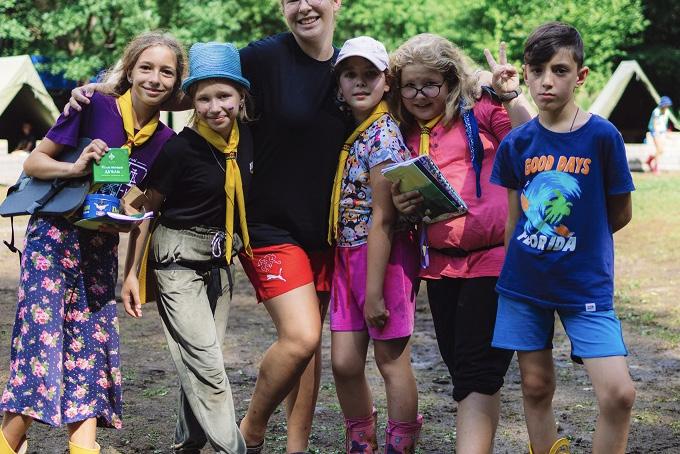
32
- Mat - Sleeping bag - Towel - Bowl - Mug - Cutlery - Rucksack - Headlamp
In addition to this, the NSO reimbursed each Scout group with the expenses related to the participation fee for one Ukrainian child per summer camp.
The Slovakia NSO considers the summer camps and activities a success since they facilitated the participation of a total of 3,901 children, among which 778 were from Ukraine.
Now that the NSO is gathering and analysing the different challenges that they faced when promoting the inclusion of Ukrainian children in the summer camps, one of the early conclusions that they have reached is that some of the Ukrainian children invited to the summer camps were still not ready to join this kind of activities, they were scared to leave their homes and families, and need a more specific and careful assistance.
Ukraine: Demonstrating the value of NSO collaboration
Ukraine’s approach to the summer camps was based on the cooperation with other NSOs to support the participation of Ukrainian children in their camps.
In Czechia, for instance, 29 Ukrainian children and 8 scout leaders spent two joyful weeks in August 2022 together with Czechian Scout volunteers in the southern part of the country.
Even though the surrounding situation was highly sensitive and unpredictable, the interest and collaboration from the two NSOs made it possible. NOSU representatives and Czechia national and local Scout coordinators were deeply engaged and willing to overcome together the inconveniences and difficulties. The UAct project has instigated the spirit of collaboration between NOSU and Junak, and both NSOs agree that the efforts were completely worth it.
Staying faithful to the Scouts’ methodology of learning by doing, the NSOs pulled together some of the main challenges confronted during the process:
- Gathering the offers of Czech campsites from local scouts
- Negotiations with potential donors
- Searching for Ukrainian participants
- Matching the campsite, the time slots and the financial support opportunities.
As this was a completely new situation for both of the NSOs, there were several new processes that needed to be established to assure children’s safety and legal compliance with the Czech rules when scouting.
33
Scouting as a mobilizer to deliver Humanitarian Action response

Active citizenship and duty to others is a core to Scout values. Scouts learn practical and soft skills that are invaluable during humanitarian crises, which we have seen locally in response to covid, refugees and natural disasters like flooding. However, Humanitarian Action has never been a visible priority within the Region, until the war in Ukraine began, and the Scout volunteers and team members became the first responders, setting the basis to an unprecedent network of young people that were voluntarily reaching for support, moved by one only reason: willingness to support.
Through different mechanisms and areas of work, the volunteers in each of the nine UAct countries and NSOs across the region have demonstrated that support is provided in uncountable ways, each of them responding to the specific needs that the communities required.
NSO’s actions, however, have not always been individual and specific to each country. This project aims to incite the development of a collaborative, fluid and organic network of humanitarian responders – where the relationships built emerge, grow and adapt to achieve their purpose, to respond to members’ needs and to opportunities and challenges in their environment. The UAct project hopes to facilitate their construction through information exchange, creation of common spaces to share knowledge and experience (workshops, conferences, websites), joint project work, etc
Scout’s inclusiveness in this humanitarian action response has enabled to reach people most affected by a crisis with the services, assistance and protection they need, while ensuring their effective participation in the planning and execution of the response. A multi-dimensional understanding of the drivers of inclusion and integration has been a very important element on the development of each NSO’s year calendar and action plan:
PolandThe National Scout Organization of Poland provided support to 253,821 Ukrainians through educational programmes, activities and first aid support delivered across more than 80 information and reception points have been utilised across the country.
As mentioned earlier, one of Poland’s biggest priorities was to include the provision of psychological assistance in their actions and programmes. In their delivery of psychological first aid, the NSO engaged Ukrainian psychologists who worked with Ukrainian children at the summer camps. However, Psychological First Aid was not only provided to the Ukrainian population, Poland NSO realised at the early stages of the emergency situation that mental
34
health and psychological support was also a risk factor affecting Polish Scout volunteers (including children, youth and adults). Therefore, the NSO provided these services also to Scout leaders and volunteers to ensure their wellbeing.
Some of the services provided by Poland NSO include:
• 10 trainings on how to run activities in Polish and Ukrainian, as well as how to safely run this year’s summer camp
• 17 trainings for safety rules during summer camps, based on WOSM’s Safe from Harm policy

• Organisation of several transport systems from Poland to Ukraine
• 2 ambulances delivery
• 1 off-road car for city municipality
• Presented the UAct partnership at the 11th World Urban Forum
• Shared best practices and lessons learnt from the UAct project at a conference organised by European Economic and Social Committee
• Presented Scout’s response to the Ukrainian humanitarian crisis and the importance of non - formal education at the UN General Assembly
In September, scouting resumes and new engagement opportunities arise. In Poland, a total of 10,120 young people are joining Scouting troops this year supported by 1,150 Scout volunteers.
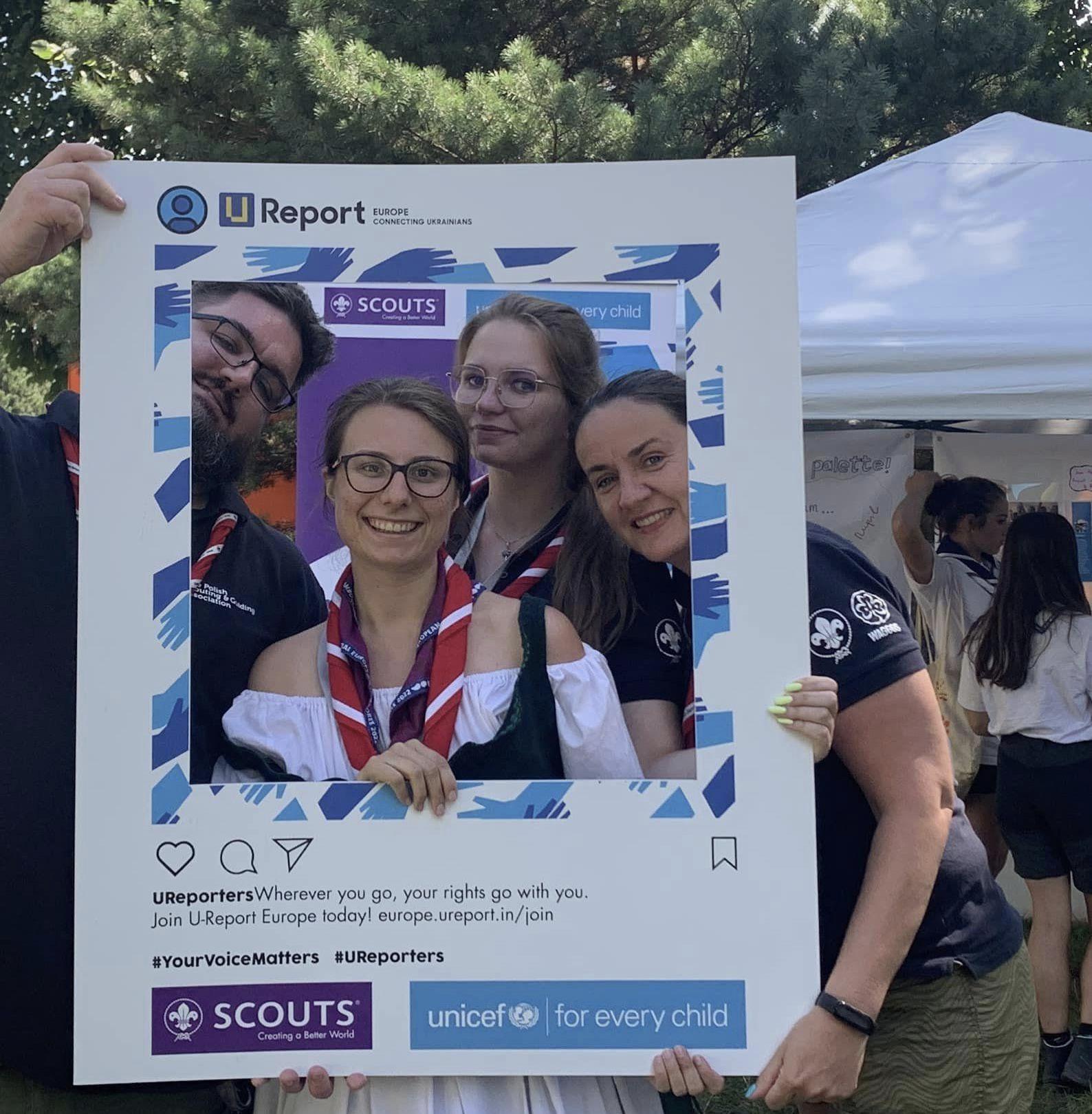
35
Ukraine
“As a Ukrainian Scout I am proud of NOSU leadership. Seeing how they show courage in the face of adversity, how supportive and engaged they are, checking on everyone’s wellbeing, sharing useful resources and answering messages, even though most of them have to hide in shelters several times a day and spend their nights underground.” - Quote from ESR webpage..
NOSU supported a total of 3,745 Ukrainian adults, among which 1,961 are children.
Other very important actions organised by the Scouts team members in NOSU include:
- Purchasing, collecting and distributing essential items (like medicines, food and water) for the civilian population
- Providing with shelter supplies like sleeping bags, blankets and mats
- Setting up a field kitchen to cook and provide meals for the community
- Launch a social media campaign “Don’t Abandon”, #inUkrainian, encouraging people to take their pets with them when evacuating
- Organising different teams to collaborate on avoiding animal abandoning
- Well-being and spirit’s lifting activities: such as an online workshop with experts on self-care and well-being
- Organising recurrent meeting and safe spaces with children where they could share their thoughts, feelings, emotions
- Delivering Psychological First Aid training to Scout leaders
- Maintaining regular communication with NSOs under its activities that are being delivered outside of Ukraine, to ensure Ukrainian children are integrating well into the host communities
- “NOSU Youth project” presentation meetings in Dniprio (Ukraine) and Gdansk (Poland)
- Delivering of a training focused on health and medical assistance provision in humanitarian crisis situation
- Creating a Telegram channel to facilitate the contact with the Ukrainian refugees based in Dnipro and Gdansk

- Engaging with hostels and shelter services outside Ukraine, for example in Poland
- Encourage Ukrainian children’s participation in summer camps outside of Ukraine
- Collaborating with the refugees and IDP’s settled in Bakhmut
- Actively promoting the use and information provided through the UReport system
36
From a programmatic perspective, at the beginning of this partnership NOSU focused on processing and establishing partnerships with the different NSO leaders who were willing to adapt their programmes and activities to include and integrate Ukrainian refugees and IDPs.
The refugee and IDP-focused component of the programme includes the themes of safety, health, prevention, risks and some national aspects to preserve the culture of Ukraine. The programme is envisioned to be a nearly 300-page document that also contains information and procedures about meetings, trainings, games, surveys and more.

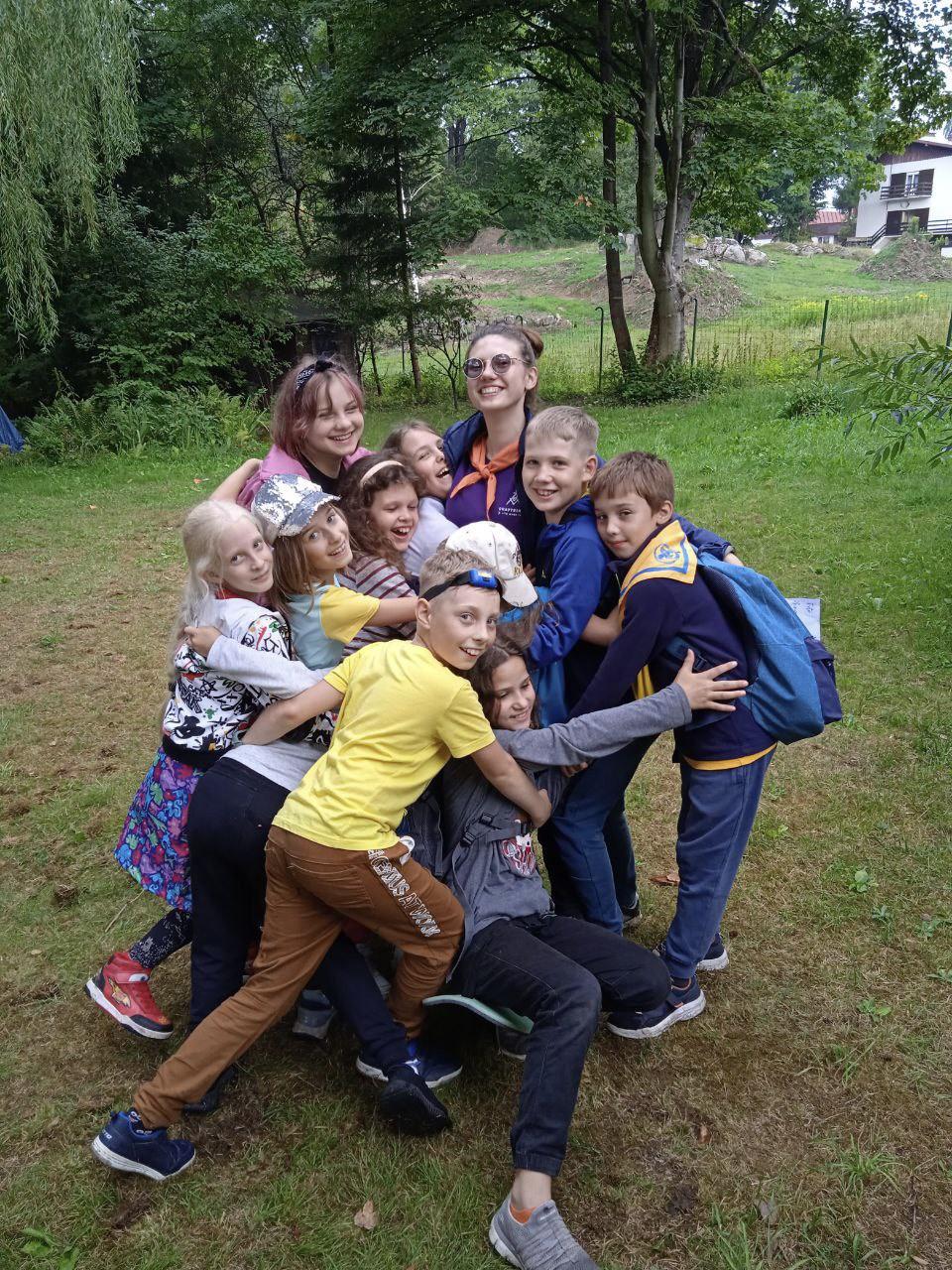
37
Czechia
Czechia NSO is leading activities to integrate Ukrainian children and youth into the local communities. During this reporting period, support has been provided to 6,642 people, of which 3,160 were children.
Czechia NSO’s primary focus has been the integration of Ukrainian refugees into Scouting and the community. To achieve this, the NSO has focused on:
- The promotion and dissemination of information pertaining to Ukrainians joining Scouting activities, through social media communications, newsletters, and a website in Ukrainian targeting Ukrainian parents.
- Launching a bilingual (Czechian – Ukraine) children’s magazine, that includes an article encouraging Scout troops to integrate Ukrainian children in their activities
- Opening the Ukrainian – Czech Centre - a library they opened offering Ukrainian books, sports afternoons in Prague with over 100 Ukrainian participants
- Deliver trainings for Czechian Scout leaders on how to integrate refugees and IDPs
- Promotion of the different possibilities for Ukrainian children to participate in the summer and day camps
- Translating basic Scouts documents, including the educational methods book, and health and safety information for Ukrainians
- Creating three “Scouts Merit Badges” under the categories of linguistics, camping and sports
- The Scouts groups from Prague have created a new Scout unit especially dedicated to welcome Ukrainian children, aged 10-14 years
- Cooperation with other organisations such as The Salvation Army in the Czech Republic
- Publishing two videos (video 1 link, video 2 link) that record the actions and activities carried out by a Scout leader that show how to help Ukrainian children feel safe and welcomed
Czechia NSO launched the Laskavo financial programme whereby financial support was granted to activities organised by Scout units that help Ukrainian refugees. Czechia NSO units could apply for financial support to:
1. Invite and accept Ukrainian children to Scout summer camps
2. Organise day camps for Ukrainian refugees
3. Organise various activities for Ukrainian children such as sport activities, games, cooking together

38
The management of this programme involved several processes as approval requests, agreements management, finances and budgeting management, and both internal and external communication opportunities.

As part of the programme envisioned over the following months, Czechia NSO is preparing an updated version of it through which Ukrainian children will receive financial support to attend the autumn camps and envisioned Scouting activities.
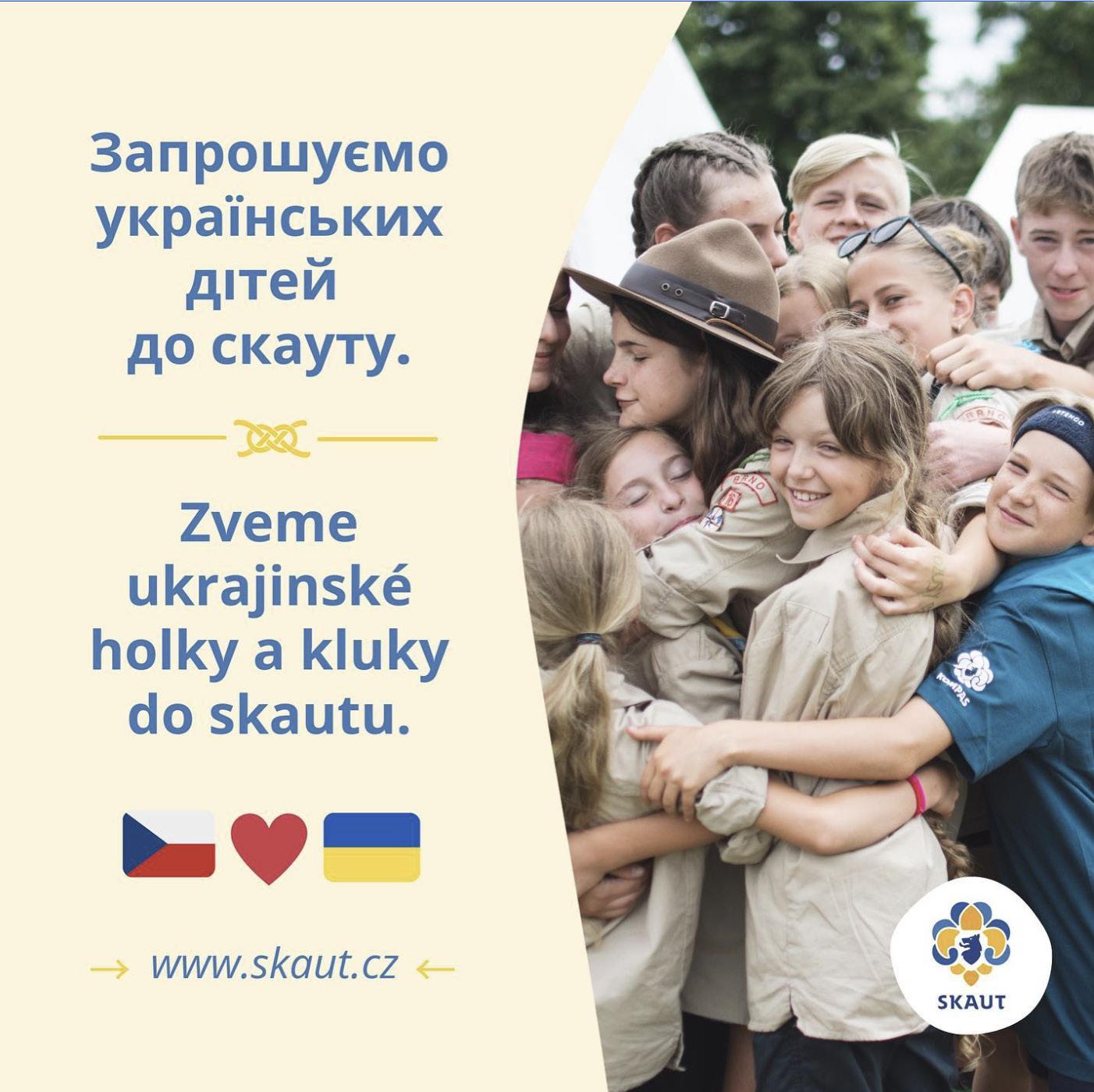
39
Hungary
Hungary NSO support has been provided in two main locations:
The Zubéta refugee shelter were the Scouts volunteers and team members have focused their actions in:
- Establishing and coordinating the volunteers visit to the center to play with Ukrainian children
- Financing lunch to the 50 Ukrainian children living there during the months of June, July and August
- Providing with Ukrainian – Hungarian translation services in the activities delivered
- Organising trips for the children living there
- Hiring two social workers to assist in the delivery of the activities in the shelters

- Organising and delivering training and informative resources on how to safely build trusting relationships with refugee and IDP children and adolescents built on peace, education and human dignity
- Creating a “School starter pack” to support the Ukrainian – Hungarian School and Zubéta
- Organising a three-day long educational programme for the Ukrainian refugee children
The Scouts Kucko:
Launched in August, the Scouts Kucko was envisioned to provide a safe space where Ukrainian children could spend the day, in order to allow their parents to tend to important responsibilities.
The NSO team members, in collaboration with psychology and education professionals delivering daily assistance at the Kucko, developed an interactive diary where the children can bond with their emotions and learn more about Scouting through the different activities the booklet proposes; like to draw their usual rooms, their best friends, to share a fact about them with their classmates, create a painting using nature elements, color the Scout’s flag
As the summer season has come to an end and many of the Ukrainian children who visited the Scouts Kucho on a daily basis have been integrated into the Hungarian schooling system, the NSO is currently transforming the use of the Kucko, adapting it to make it a resourceful place where Ukrainian children are offered the opportunity to actively engage in their local communities, or have a safe space to unwind from their difficult situation.
40
In addition to these constant acting points, the NSO has also published an article in their website, link here, where the support provided so far by Scouts volunteers is explained, and they raise awareness on the impact that the Scout groups have had so far on the long-term assistance and support to the Ukrainian refugees. They also participated in the Sziget Music Festival, where they launched a Scouts Stand where the festival participants could get information about the UAct project, make postcards for refugee children at the Scout Stand, as well as learn more about the URreport.

As part of the ongoing communication strategy, Hungary NSO is very active through their social media channels, publishing articles and posting reports. The NSO focal point also participated in a National TV show where she presented the UAct project’s activities, emphasizing on the services and support provided at the Scouts Kucko.
A special mention is dedicated to the Scouts activities organised at the Miskolc centres, where the volunteers have organised a Play House for Ukrainian children, and different manual and artistic activities for youngsters and adults to join.
Last, but not least, two members of the NSO of Hungary have been trained on the IASC guidelines on Mental Health and Psychosocial Support in Emergency Settings.
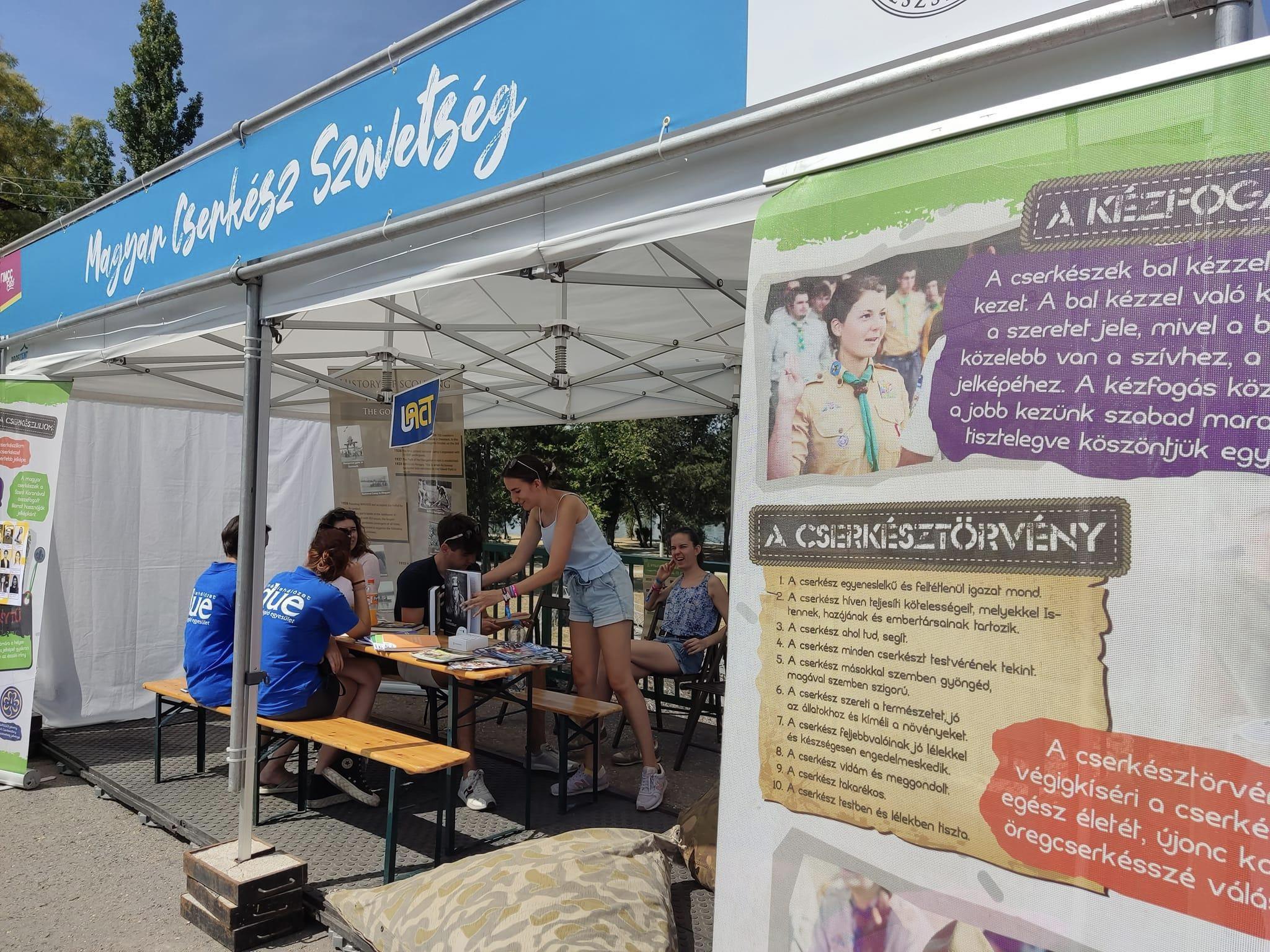
41
SCOUT NEWS

Integration into the schooling system
With the arrival of September and the beginning of the school year, the NSO identified that the interests and participation of Ukrainian children in the Kuckó noticeably decreased. Furthermore, the venue where the Day Care Center was operating wasn’t available anymore from mid-September, so the Hungary NSO team members needed to reflect on the future of this service. The NSO asked themselves about the main needs identified from the Ukrainian families, the age and background from the kids that attended most the Kuckó...and many other aspects that englobed the Day Care Center project, until they reached the conclusion that they day-care opportunities were mainly needed during the holiday months, while the needs
during the schooling year was directed to the development of strategies that would encourage Ukrainian children’s integration into the system.
Once the school year starts, the refugee children ment to attend the school or kindergarten. Since it was not possible to make the Scout Kuckó provided by the Hungarian Scout Association a public educational institution, the Scouts envisioned a new need: to provide Ukrainian children with a schooling support system that could help them to follow the rhythm and programmes.
Following on this, the Scout’s Kuckó was transformed into a “Moving Kuckó” service, which offers the following activities and services:
• Provide support and afternoon sessions in schools
• The new venue used to deliver daytime and afternoon sessions, professional meetings, internal trainings and educational sessions on Tuesdays, Wednesdays and Thursday would be the Charity Center (instead of the Single Parent Center)
• The delivery of programme sessions, with the support of Scouts volunteers, from 5pm at the refugee hostels and other reception houses
#6 monthreport 01.dic.2022
Collaborating with other organisations

Once the new Kuckó concept was established, the NSO needed to partner with school and civil institutions to know which places were offering schooling opportunities for Ukrainian children, how old were the children attending these, and whether these institutions would be open to mutual cooperation between the NSO and the Scout volunteers.
Before initiating with the school visits, the Kuckó team received a 4-day training, where various topics were discussed, such as basic communication skills, age group knowledge, development of learning skills, formation of an effective helping attitude in the refugee situation. Among the team
members supporting with the Kucko programme, there are pedagogues, teachers, psychologists, coaches, and creative art activity leaders.
The NSO established direct contact with school principals and teachers and, together, identified that the majority of the Ukrainian children in schooling ages were attending mostly Ukrainian and Hungarian-speaking schools, mainly in the elementary school and upper grades.
The Kuckó team currently attends 5 schools were they:
- Offer activities and programmes developed to motivate Ukrainian children’s integration through different games.
These activities englobe usually around 20-25 children
- Offer afternoon study sessions to small groups, where they provide support with homework, Hungarian language classes and assistance. These sessions welcome small groups formed by 6-8 Ukrainian children
- Offer different programmatic sessions according to each age group. These sessions include activities such as coloring, painting, joint games and welcome about 10-12 children
An important factor to take into account is that an interpreter is also present at most sessions to help with communication.
School starter packs
During the months of August and September, the NSO prepared 200 school starter packs for refugee children. All these items were handed together with the activity booklet the NSO created for the Ukrainian children. These packages contained:
#6 monthreport 01.dic.2022
- Schoolbag - Lunch box - Drinking bottle - Notebook - Different school materials
Romania
At the beginning of the conflict, with the support of 230 Scout volunteers, Romania provided border support such as:
• Providing online or border guidance to over 700 people by organising volunteer scouts in specially designed info-point spaces.
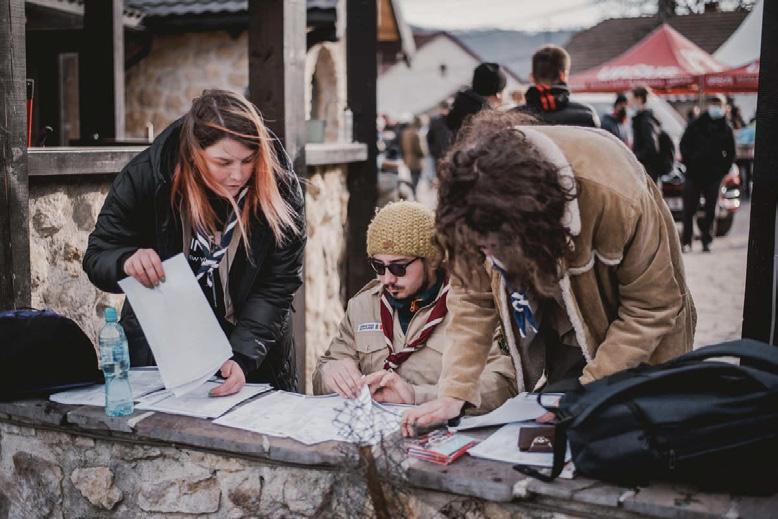
• Transporting from the border approx. 378 people / 23,000 km.
• Finding or providing direct accommodation and food for approx. 611 people in various cities.
• Carrying out three shipments of medicines and medical supplies to Ukraine.
• Carrying out four shipments of non-perishable products, hygiene materials and clothing to the Republic of Moldova.
• Contributing daily to sorting and transporting items for refugees (food, water, clothes, beds, hygiene items, etc.) to more than 8 collection points in the country.
• Helping with the development of logistical issues in 7 centres where refugees were housed (information support, meals, accommodation, etc.),
• Helping with equipment and supplies for the refugee camps in Botosani.
After these intense weeks of border support, and, following Safe From Harm advices, the NSO identified the need to plan and deliver several programmes based on volunteer’s wellbeing and mental health. To fulfil this commitment with the team members that had so rapidly jumped in support provision, the NSO organised different mindfulness, wellbeing and coaching trainings with the volunteers to requested them.
As per the project’s planning, Romania NSO, established two main project phases:
1. Before autumn, where they would develop tools and train volunteers with the help of experts from outside the organisation in dealing with children and young people that are refugees
44
2. After autumn, when they would run and develop the educational centre in Bucharest for children and young people in order to offer the refugees opportunities for education and community integration. The Edu Hub (Youth Center) opened on the 13th of October, and already welcomed 40 Ukrainian children to its first activities. In order to make a sustainable and useful use of the resources provided by the center, the NSO concentrated the center’s first activity on a Questions & Answers session with Ukrainian refugees to be aware of their needs and understand how they can best offer support.
Romania NSO and UNICEF RO Office have collaborated to develop a joint programme, that was delivered at the Training of Trainers sessions at the end of October. During these training sessions UNICEF’s experts facilitated a programme based on the Adolescent ToolKit, Ukrainian refugees’ current situation, migration flows, how to deal with children suffering from trauma and abuse, and how to best respond to their necessities.
This training does not only represent an extremely useful opportunity for Romania Scout leaders, it is also evidence of how the network and connections between the NSOs is starting to blossom, as 10 Moldova Scout leaders were also invited to participate in this training and therefore benefited from the knowledge shared along the training. Building this collaborative system would persuade both Romania and Moldova NSO members to share their ideas and engage in joint action to the extent they trust others will reciprocate.
To participate in this course, the Scouts in Romania have established as a fundamental agreement that those who undergo the training must deliver at least two activities each, where they welcome and assist an approximate number of 20 Ukrainian children.

45
Lithuania
Over the last six months, Lithuania has provided support to a total of 1551 Ukrainian individuals.
To ensure the sustainability of processes, the NSO focused heavily on adapting their National Youth Programme to the priorities of the current situation. This addressed the integration of Ukrainian children and ensuring a safe environment for them. This was also achieved through communication with Lithuanian Scout leaders on the new trainings, design and delivery of communication material, translation of the website into Ukrainian, and launching a Facebook page specifically portraying the NSO’s response for Ukraine.
To maximise the actions and reach of the UAct project, the NSO in Lithuania has:
• Participated in the recording of the Radio Shows “Ryto Garsai” (Morning Sounds), and “Time to Change”
• Promoted the project at the LRT show “We are from Ukraine” in the National Television.
• Published the story of a Ukrainian girl Scout who ran into her Scout leader from Ukraine at the Baltic Jamboree
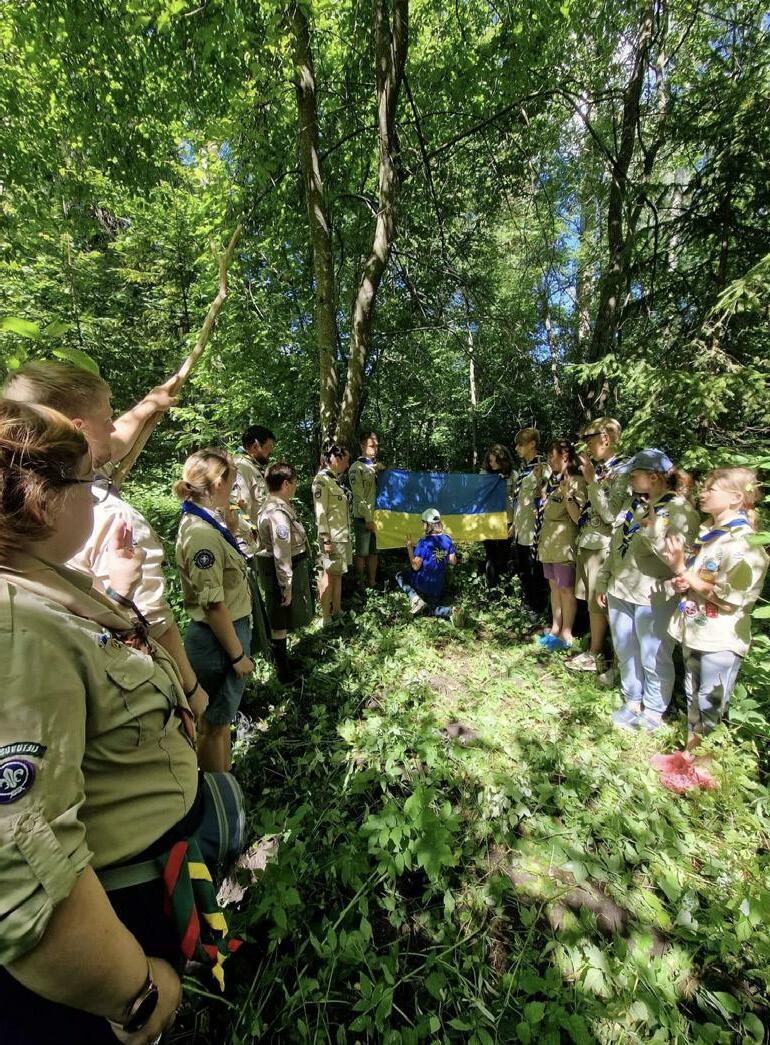
In addition, housing has been provided to six Ukrainians at the National Headquarters. The team have helped two Ukrainian women currently hosted at the headquarters to access medical care. To further these efforts, the NSO developed a network of local cooperation, that links refugees seeking accommodation with people offering it.
Once a month, the NSO focal point is meeting with the Prime Minister of Lithuania, and weekly with the Minister of Social Affairs, to advise them on non-formal education strategies, methodologies and programmes, as well as on best practices to support the integration of Ukrainian children into their new communities.
As part of their autumn plans, the NSO has delivered one of three camps planned for autumn. The NSO anticipates around 30 children would participate in each camp, meaning approximately 60 children would benefit from the camps. Integrating Ukrainian children is one of the main objectives of the autumn camps.
46
Slovakia
This NSO created special guidelines for their Scouts leaders where they included key information in educational programmes, as well as real experiences, challenges and key tips from the local units on how it is best to organise the Scouts’ actions and support as many children, youth and adults as possible.

At the beginning of the crisis situation, the Slovakian Scouts were coordinating the border crossing at Veľké Slemence. Nonetheless, since the number of Ukrainian refugees arriving in Slovakia has notoriously reduced in the past weeks, Scouts are not volunteering at this cross border, at the moment, and will be asked to help once the situation requires it. Taking this into account, Slovakian volunteers are currently providing support in:
1. Michalovce Center (referred to as LCCM), the Slovakian NSO team members were in charge of registering volunteers and taking care of their coordination. At the center, there was a refugee registration point available 24 hours a day, 7 days a week. The volunteers assisting in this center (2 volunteers per each 12-hour shift, alternating day and night shifts) were supported with accommodation, snacks and beverages. As an example of the Slovakian volunteers’ hard work during at the Michalovce center, during the month of June, 5,261 volunteer hours were completed by 131 volunteers through the Scout Service.
2. Assistance Center in Bratislava, located in Bottova Street. Here, the Scouts provide information, guidance and register the Ukrainian refugees arriving on a daily basis. During the month of May, 312 volunteers supported this center.
In addition, some Slovakian Scouts volunteers are also cooperating with individual local offices located in the centre of Bratislava, such as the immigration police, the Office of Social and Family Affairs, legal affairs, psychologists.
47
Moldova
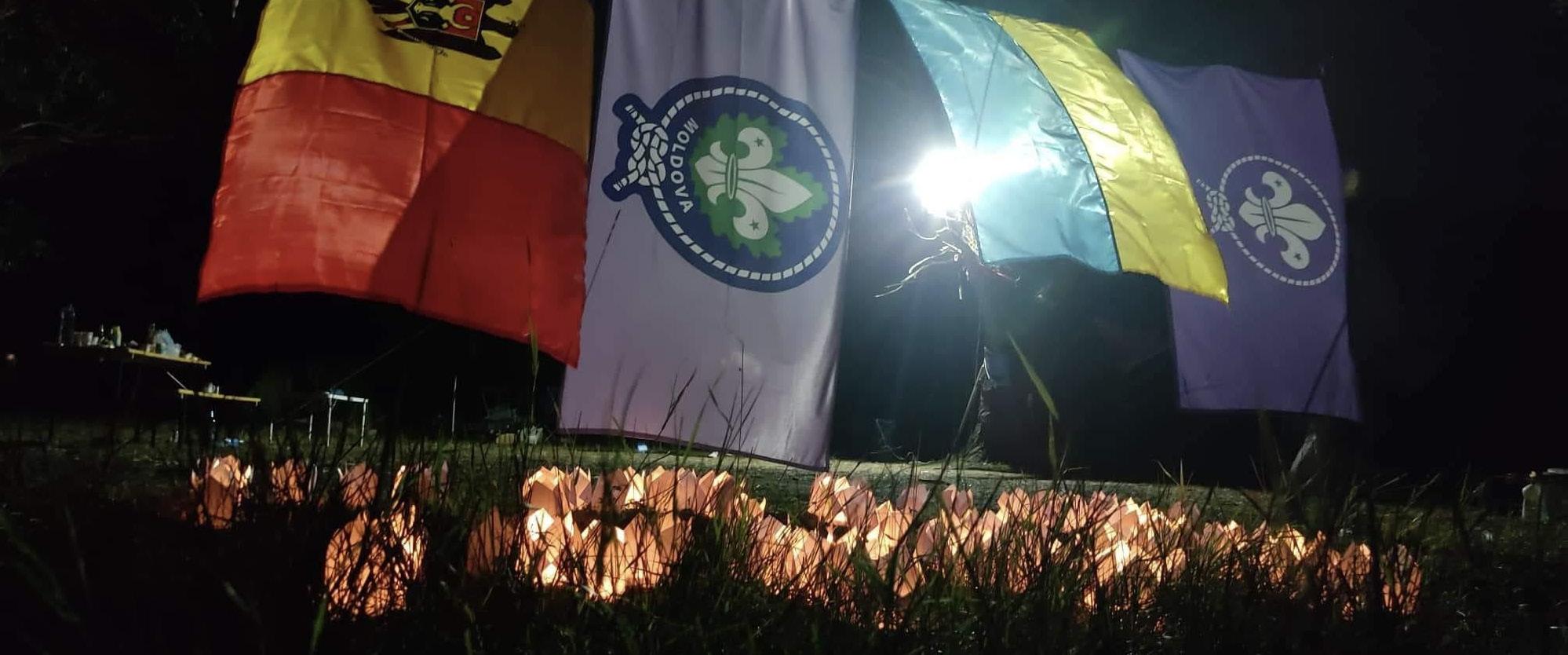
Moldova NSO’s main actions in this reporting period has been supporting Ukrainian children, to whom it has reached 228 children.
At the beginning of the project Moldova identified some clear needs that would allow the NSO to undergo the necessary activities related to the project more sustainably and efficiently. One of them was the training of group leaders on the reporting system and external communication aspects.
As part of their long-term planning, the NSO aims to have a fixed member in their team that is entirely focused on Safe from Harm, to implement the global policy and continue training volunteers and leaders.
Moldova has demonstrated to be a very strong actor in the provision of direct and immediate humanitarian support to the refugee population. Building on this, the process that Moldova is using to address the needs of refugee families who live at the houses provided by the Scout members and the local communities has sparked great interests from other NSOs. This process could be used as a best practice, whereby the NSO has been delivering the humanitarian aid tailored to each family’s exact needs on a weekly basis.
Moldova has demonstrated how crisis response does not necessarily need to be linked to large-scale actions. Providing a local approach to humanitarian action is also a very valuable and needed path to follow if it matches the beneficiary community’s needs. The volunteers’ and Scout leaders’ permanent presence in the refugee shelters has earned people’s trust by demonstrating integrity, transparency, humility and honesty. The Ukrainian refugees coming into contact with the services and projects provided by Moldova NSO feel safe and protected.
48
LatviaLatvia has focused the Scout volunteers’ actions in developing a support network among the team members to where they can refer and assist each other on the different challenges that scouts volunteers might face when integration and including Ukrainian refugees into their programmes and activities.
When providing support to Ukrainians, Latvia scouts have focused their actions towards liaising with different partners such as the Ministry of Finance to include Ukrainian refugees into social housing and integration programmes; as well as embracing the participation of Ukrainian children in the different state and municipal camps.
As a result of the advocacy and lobbying actions undergone by the Latvian NSO, the Government of Latvia has created a grant programme for NGOs who are working with refugees, linked here for more information. The Government also established some key legislative amendments that will take into consideration specific needs and requirements from and for refugees such as: housing, food, health and language. Latvia NSO started a cooperation process with “Borschsoup kitchen” women to provide an educational activity, foreseen to be delivered to Ukrainian children.
Latvia NSO has supported the youth organization “Young Folks” with the delivery of meals to Ukrainian IDPs at the Riga bus station.
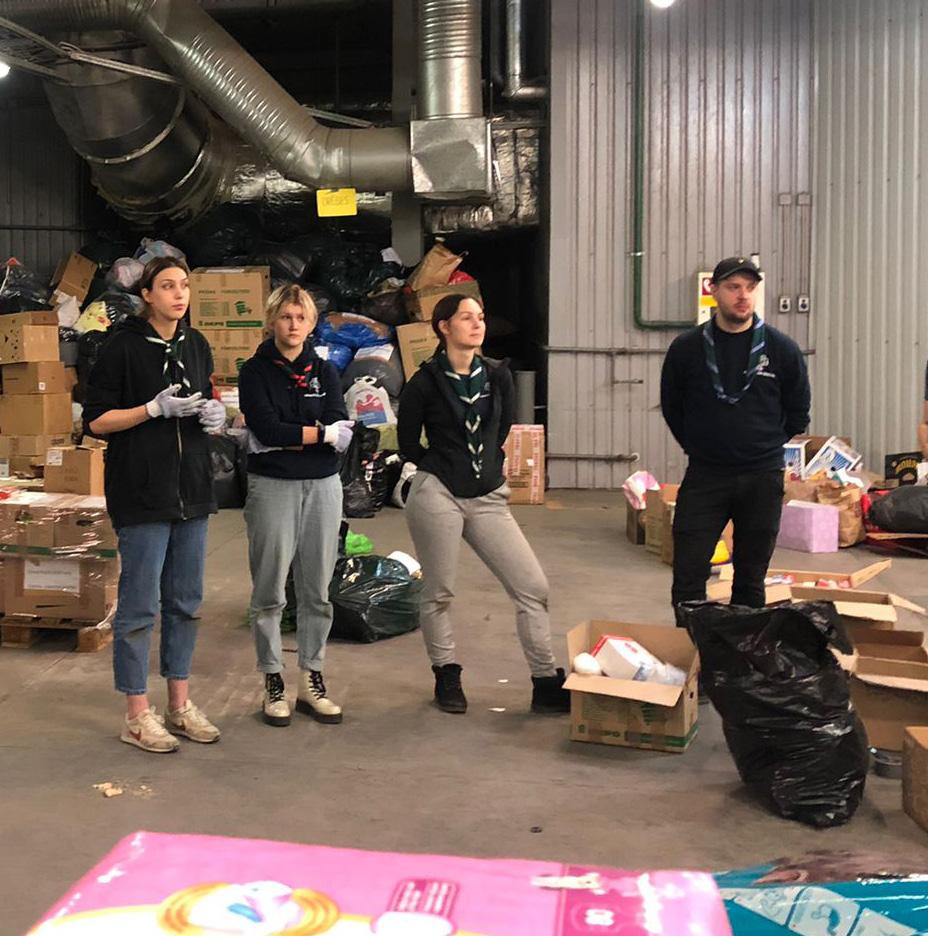
The NSO is also currently looking into the possibility of engaging with different partners to create a youth centre in Riga for refugee children, where different activities and programmes can be planned for both children and young people.
There are many valuable actions and activities that each NSO has moved forward under the scope of the UAct project, all of them accessible in the project’s best practices guidelines.
49
Disclaimer:
What contexts affect the future of the UAct project? Future

The war in Ukraine and its evolution
Ukrainian individuals have now faced more than six months of escalating violence, devastation and large-scale displacements.
The UAct cooperation agreement will continuously focus on addressing the immediate needs of Ukrainian refugees, as well as developing programme supporting strategies to organise a humanitarian response to the crisis in Ukraine that is sustainable and can have a long-termed impact. Through these first six months the strength of the Scout Movement has relied in the promotion, empowerment and support provided to young people to help them feel safe and integrated in their new communities and equip them with the skills they need to navigate the coming period of their lives.
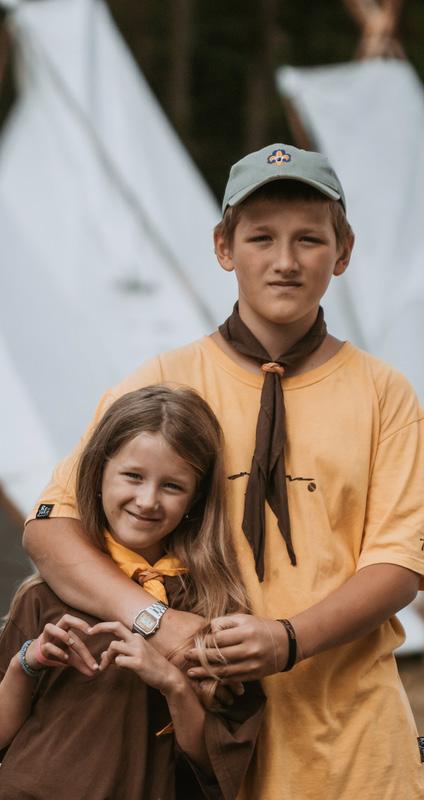
Based on this perspective over the following six months, NSO activities will still continue the provision of critical and life-saving information to all Ukrainian adults and children, emergency supplies for refugees, accommodation, protection services, legal support, health care services and any further requirement or need identified by the Scouts volunteers. However, beyond the immediate response, the NSOs and UNICEF will develop new approaches and trainings that will strengthen the support provided to the Ukrainian people in need and the future of these topics within NSOs. This will include trainings in Management of Scout Volunteers involved in Humanitarian Action, Dialogue for Peace, Training for Trainers, envisioned to skill the Scout leaders with the necessary tools (literally and figurally), to deal with stress, burn out, language barriers or the use of UNICEF’s expertise, communications and advocacy in humanitarian action or how to speak war and engage with conflict victims safely.
Moreover, these next six months will also see the launching of a specific Youth Programme developed by NOSU (Ukrainian NSO) team members that aims to provide reference guidelines, adaptable to different needs depending on the stage that the NSO is on with their humanitarian response, that will be of immense value in future crisis situation where Scouts will actively reach for support.
With the ever-changing reality and diverse country circumstances, NSOs and the region alike will continue to observe the refugee population flow and collaborate with different partners to provide appropriate support.
The migration fluctuations from Ukrainians is a noticeable factor to take into consideration as represented in the table below. Some Ukrainians are returning temporarily to their homes to assess the danger of the situation, check on
50
their properties, visit their relatives or support any family member in need. Additionally, the current energy insecurity has heightened the vulnerability of the Ukrainian families, thereby increasing the potential for the sheer number of individuals requiring humanitarian assistance. Undeniably, without safe and reliable access to energy, it can be significant challenge to meet the basic needs of life, such as cooking, heating or lightning systems.
The United Nations Agency for Refugee support has estimated that at least 2.3 million of the Ukrainian individuals that crossed the borders at the beginning of the conflict, have returned to their home country over the past months. These flow changes are also part of the new risk identified which consists on the verification of the data provided by the UAct project, since some of the Key Performance Indicators established at the beginning of this partnership (such as the number of individuals reached for support) are dependent on accurate collection of data without duplication, which cannot be guaranteed in such a setting. At this stage, the Region is jointly working with UNICEF on identifying the best methods and procedures to assure an accurate data submission of the support provided.

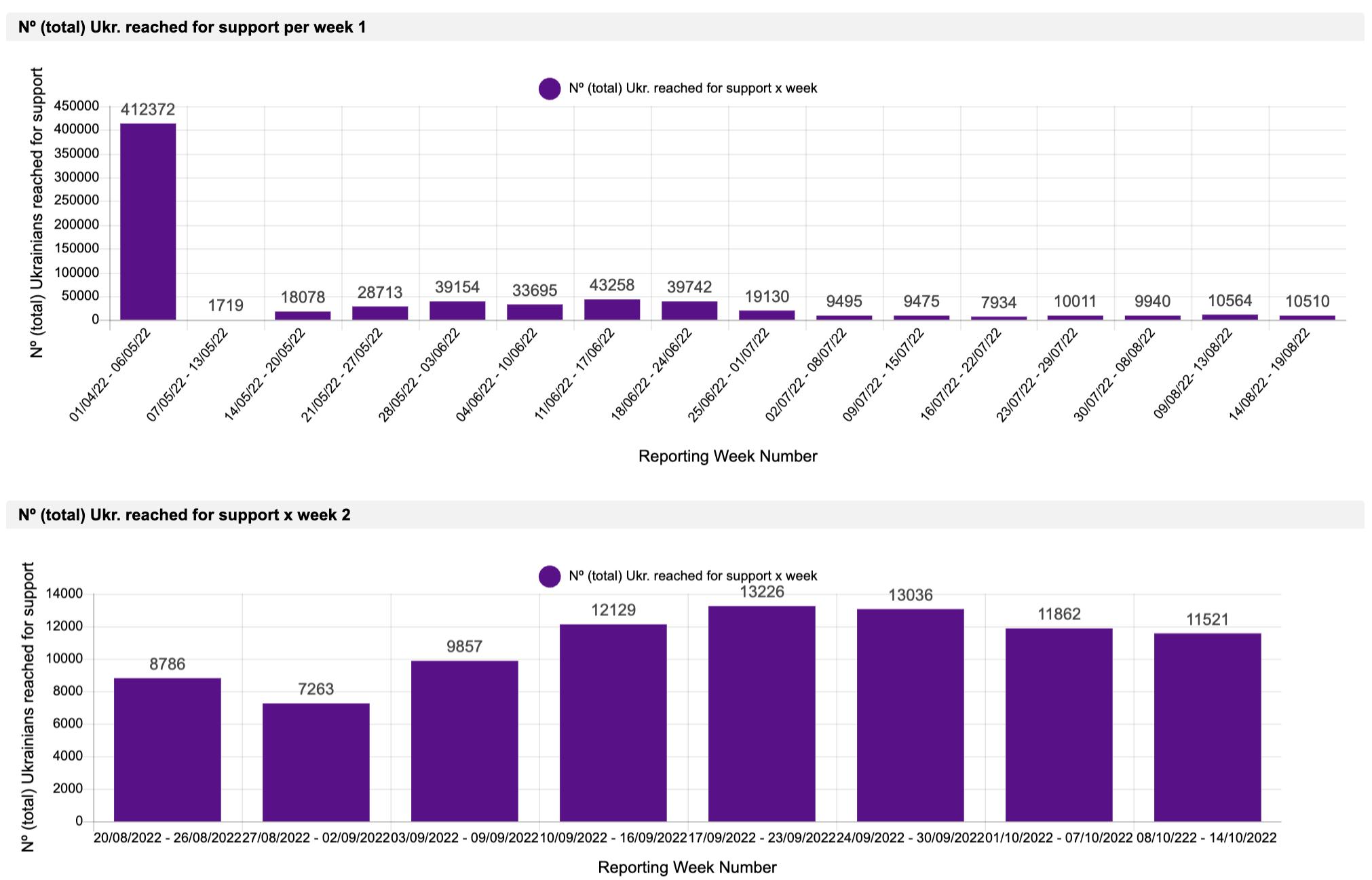
51
Capacity strengthening, continuous impact and sustainability of UAct
Enhancing competencies for Humanitarian Action

The UAct NSOs evidenced their capacity to engage meaningfully in humanitarian action, increasing the tools and expertise to adapt their Scout programme and adult training, to the particular needs of the young people and children in humanitarian context.
The next 6 months will accelerate this capacity, through the actions outlined throughout the partnership, with a commitment to providing the nine NSOs with the support and necessary skills to deliver humanitarian assistance and manage emergency situations. The UAct project aims to leverage the power and scope of action of young people to enhance them as responsive and necessary part takers in humanitarian action.
Although each crisis context is different, and each intervention will need its own approach, there are several factors, abilities and information that will facilitate the first steps of the implementation process. Through the UAct project, European and Eurasia Scouts NSOs have positioned themselves as key stakeholders in humanitarian response and first aid provision.
Learning-by-doing and be prepared encompass the journey this far and looking forward. UAct project will not only rely on educative materials, but also on the Scouts’ own experiences, lessons learnt and best practices collected to assure an effective and useful resource equipping Scouts to continue to think for themselves, analyse their surroundings and distinguish where the support is more valued or necessary.
Supporting better preparedness, capacity building, partnership management and advocating for non-formal education methodologies when delivering humanitarian action are just some of the fundaments across the trainings and learning materials handed over these twelve months, the NSO team members will be able to include in their teams, members that will know how to collaborate, apply Scouting principles, stay safe and provide a proactive response to any future humanitarian crisis.
What’s next? The potential for impact!
The UAct project represents for the Eurasia and European Scouts NSOs a unique opportunity to empower Scouts in reinforcing their activities, spreading the message of peace education and investing in preparedness for humanitarian action. As a result, the project has an ambitious road ahead, that not only exceeds its initial objectives, but also builds a stable foundation to further realise the Regional Scout Plan and the Humanitarian Crisis resolution.
By Spring 2023, the UAct project aims to focus on the below priorities, complementing the resolution and ensuring a sustainable approach to Humanitarian Action and Peace Education region-wide:
52
Continuous situation analysis and weekly reporting
Actively engaging with the Ukrainian refugee population through services and entry points
Laise with local and governmental authorities to advance Scouts’ actions where most needed
Collaborate with UNICEF and other local partners in regular needs assessment and resource mobilisation
To continue to monitor the humanitarian situation in the Region
Collaborate with UNICEF and other local partners in regular needs assessment and resource mobilisation
Continuing the activities and services provided at:
- The Youth Centers
- Refugee Shelters
- Blue Dots
- Hotspots
- Day Care Centers
- Scout camps
- Border entry points
- Communitarian food delivery points
Continuing or implement further actions related to:
- Delivering first aid supplies when needed
- Providing housing support
- Organising winter camps and local activities
- Giving visibility to and providing psychological support
- Translating Scout’s materials to Ukrainian
- Providing Ukrainian interpretation services
- Working with local services to respond to the needs of refugees
To continue to coordinate and support efforts by Member Organisations in offering help to refugees through the delivery of frontline support, integration and educational methods

53 UAct –next 6 months UAct –next 6 months Resolution Resolution
Utilise communication platforms to;
- Promote UNICEF tools Engage effected populations via social mediaRaising the visibility of Scout’s personal stories through the Scout’s Diary Highlight NSO best practise on WOSM services Upload best practises in Humanitarian action to WOSM Services; - SFH for first responders E-learning - MoVIS in E-learning - NOSU youth programme, integrating refugee response, psychological first aid and adolescent kit activities - Camp SafeFromHarm and listening ear mechanism - Adult training resources and agenda for HA - Educational materials, games and programme sessions
Complete WOSM service delivery for each NSO, one in partnerships and one in Scouting in Humanitarian Action
Identify additional service required for each NSO, as a result of the project
To promote and increase the visibility of the WOSM Service on Scouting and Humanitarian action across the Region
Quarter 3 & Quarter 4 project meeting, bringing together the nine NSOs focal points to; - Promote peer dialogue - Continuous needs assessment - Collaborate with NSOs delivering similar actions - trategic planning for preparedness and sustainable actions of the project
Virtual ‘get togethers’ and 1:1 NSO support meetings. To access unique support and share achievements and concerns
Disseminate developed materials and resources with the rest of the NSOs involved in the project and deliver a best practices guideline
Collaborate in initiatives the Peace Light, The Academy, UNICEF experts’ training sessions and youth programme
Reinforce or establish strong National level partnerships with Humanitarian Organisations
To create and support networking opportunities for the Member Organisations of the European and Eurasia Scout Regions, where joint projects and initiatives will be created to support the humanitarian response and the resilience of the Member Organisations affected by the war

54 UAct –next 6 months UAct –next 6 months Resolution Resolution
UAct –next 6 months
Capacity strengthen the network of programme volunteers working on UAct, to ensure a reliable pool of best practise for the future

Enhance core service areas in each NSO;
- Diversity and Inclusion
- SFH
- Dialogue for Peace - Growth - Partnerships and funding
Deliver Dialogue for Peace training sessions for volunteers and young people active in the response
Refine support and knowledge regarding Management of Volunteers in Scouting, for context of humanitarian action
Encourage the integration of UNICEF’s materials and expertise in programme, including; Adolescent Toolkit, communication in humanitarian crisis context, how to engage with children and young people affected by trauma with youth programme and Adults in Scouting.
Establish long-lasting action plans that includes; - Educational approaches that benefit the integration of refugees into local communities
- Ensure integration of underrepresented or vulnerable groups
- Support preparedness for HA crisis
Collaborate on a Peace Education position paper for the Region, as an outcome of lessons learnt through UAct and beyond
Resolution
To support Member Organisations to create spaces that encourage the development and implementation of peace educational programmes, through Regional Dialogue for Peace initiatives and platforms
55
For Scouting it is clear that there is a need to support the idea of tolerance, dialogue, understanding of differences. Promote solidarity as a key attitude in humanitarian response that will facilitate peaceful and constructive co-operation between peoples with different ways of life and from different backgrounds is a core objective in this work.
To assure the future of the actions agreed to adopt during the European Scouts Conference, the NSOs and the European Scout Region compromise themselves to mobilise, learn and represent together the values of the Scout movement and relate their actions with the Conference’s resolution to assure that the UAct project provides a sustainable impact on the refugee crisis resulted from the war in Ukraine.
With this report and the project overall, we hope to build an package of resources that will make Scout’s actions in building all-encompassing areas of humanitarian action; D&I, Dialogue, Peace Education, SFH to name a few, more accessible to all; every contribution is valuable to build a better future.
“Youth Engagement is the meaningful participation and sustained involvement of young people in an action for making a positive change” - From: WOSM Youth Engagement Strategy: here

56
